广东省深圳市宝安区文汇学校2016届中考英语第一轮复习 常考知识点课件1
文档属性
| 名称 | 广东省深圳市宝安区文汇学校2016届中考英语第一轮复习 常考知识点课件1 | 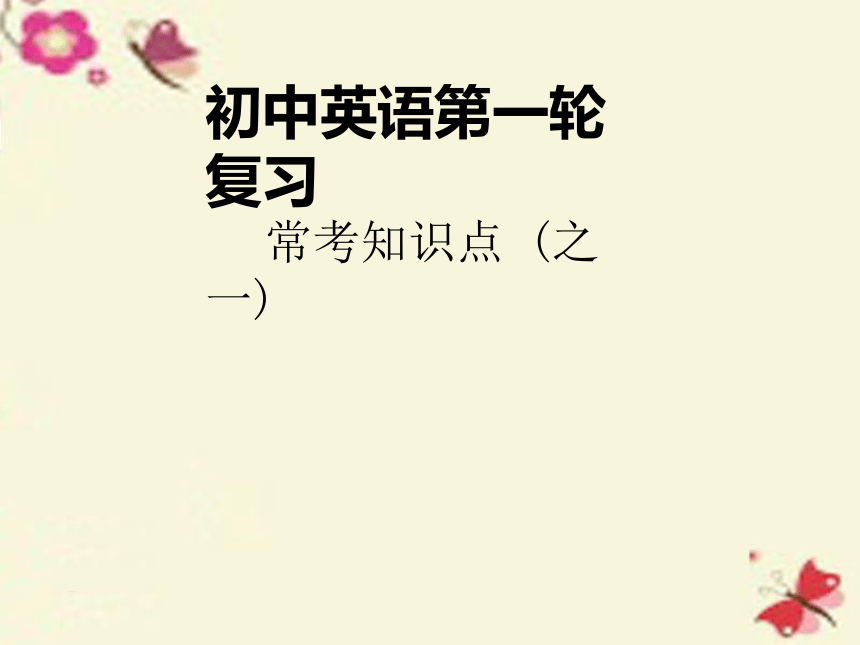 | |
| 格式 | zip | ||
| 文件大小 | 97.4KB | ||
| 资源类型 | 教案 | ||
| 版本资源 | 牛津深圳版 | ||
| 科目 | 英语 | ||
| 更新时间 | 2016-07-07 00:00:00 | ||
图片预览

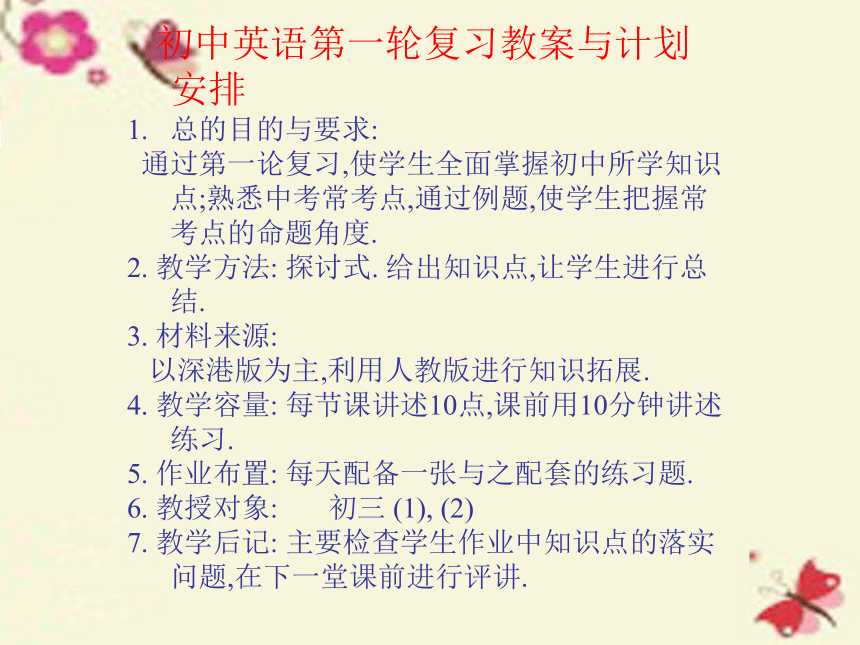
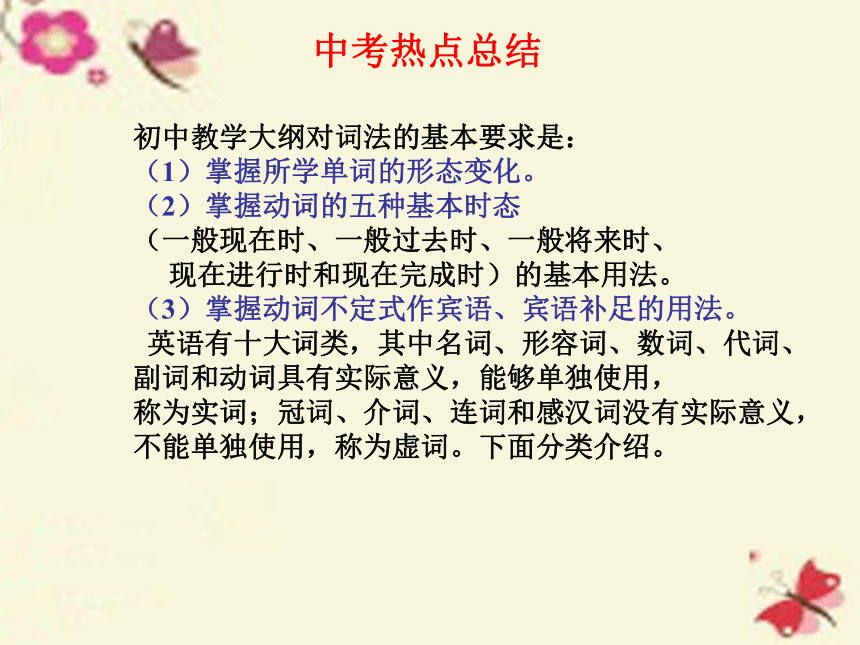
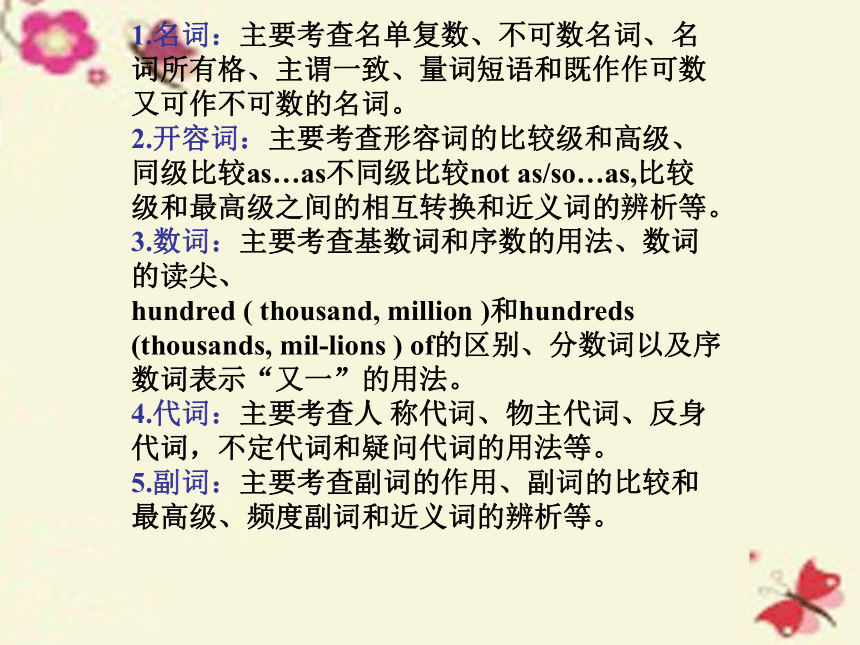
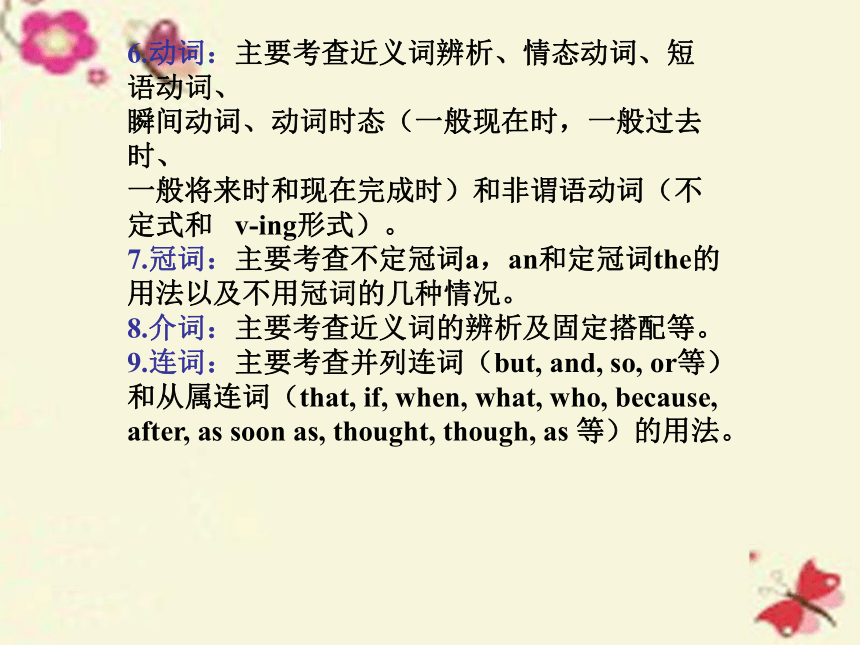
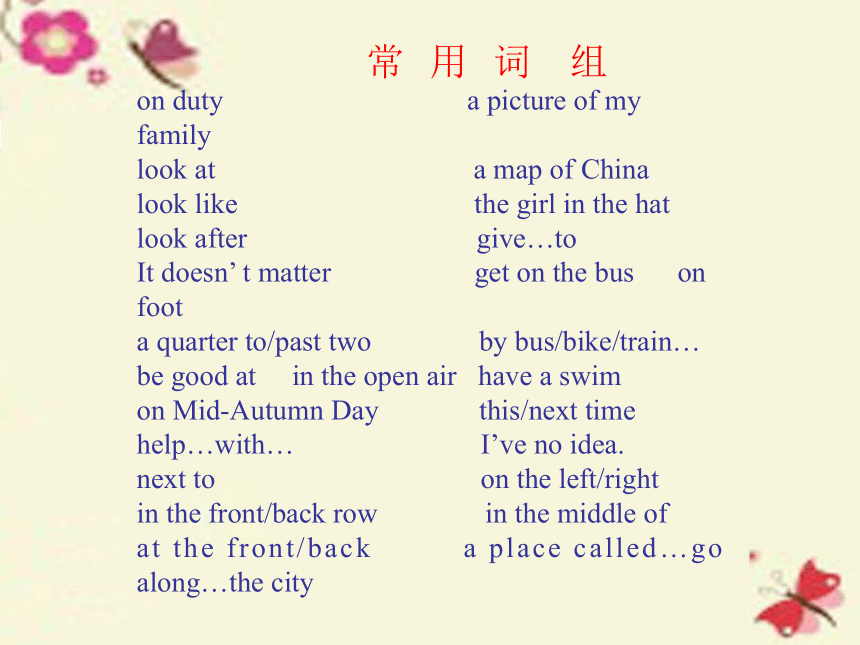
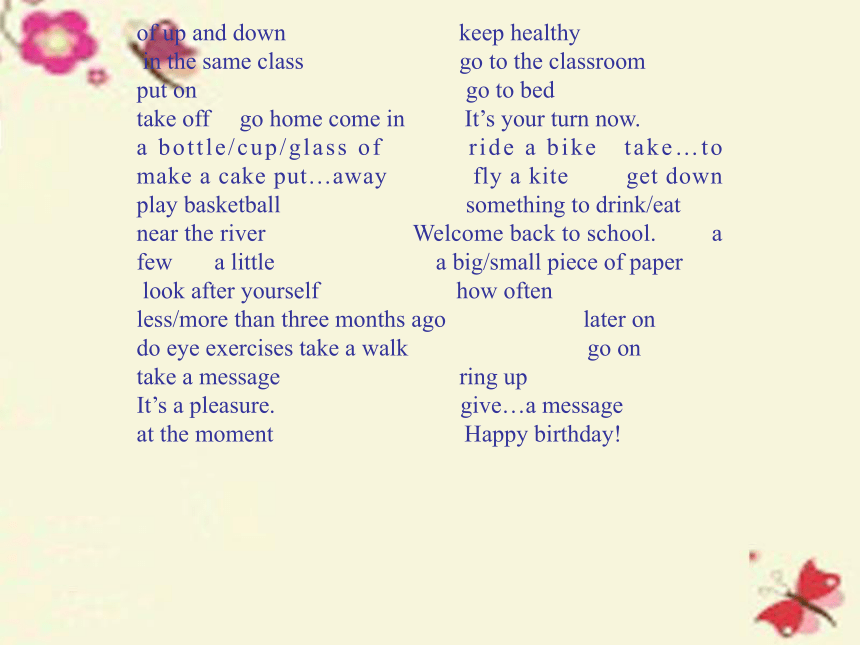
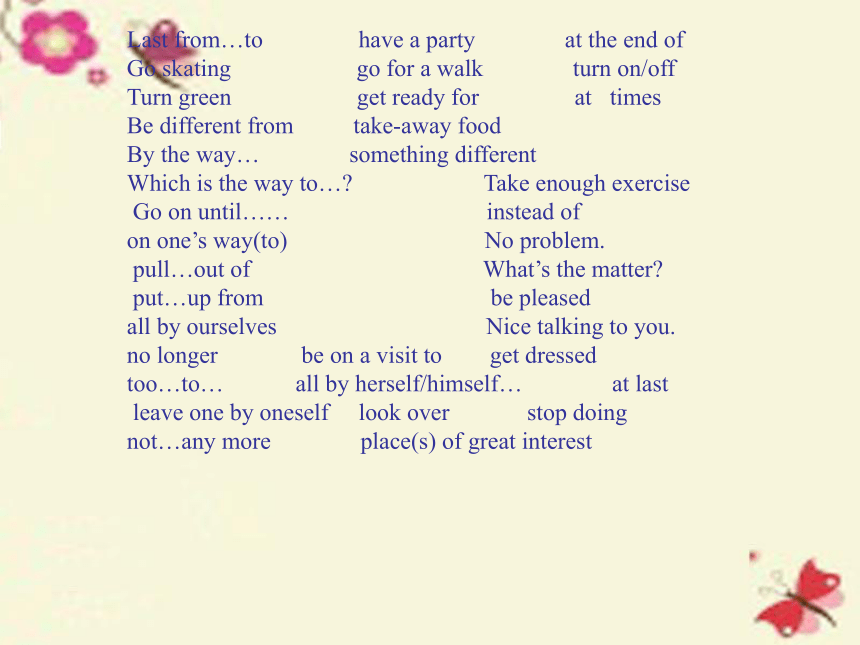
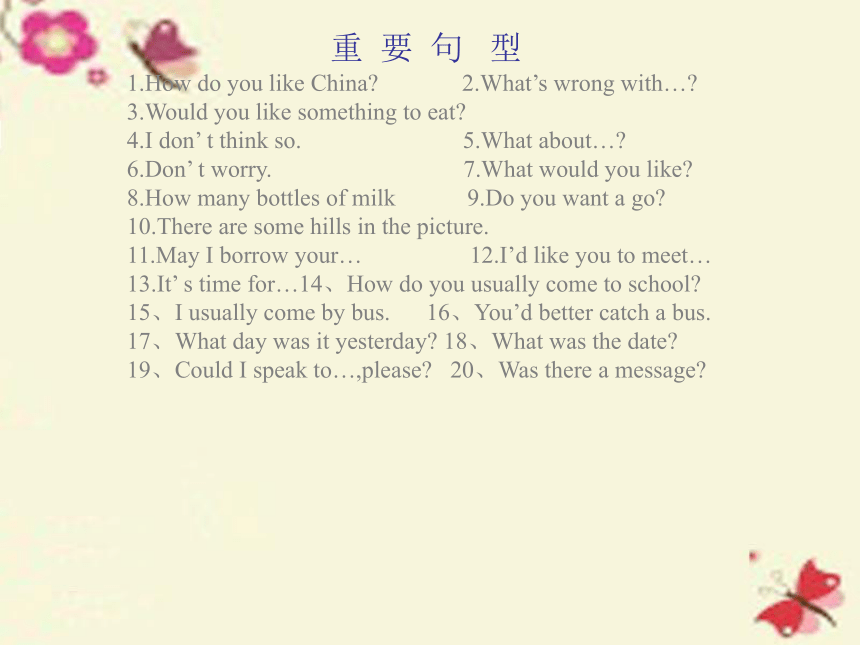
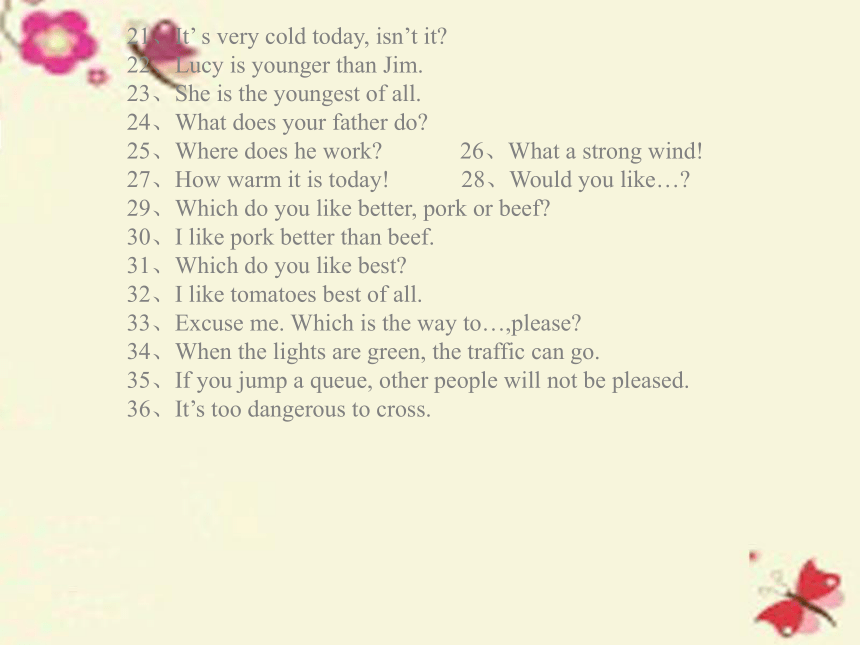
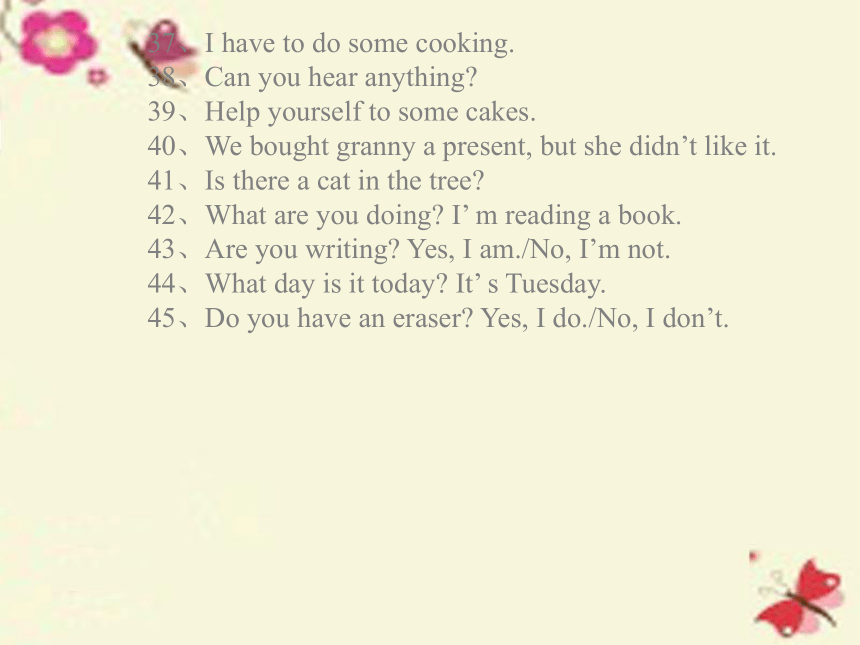
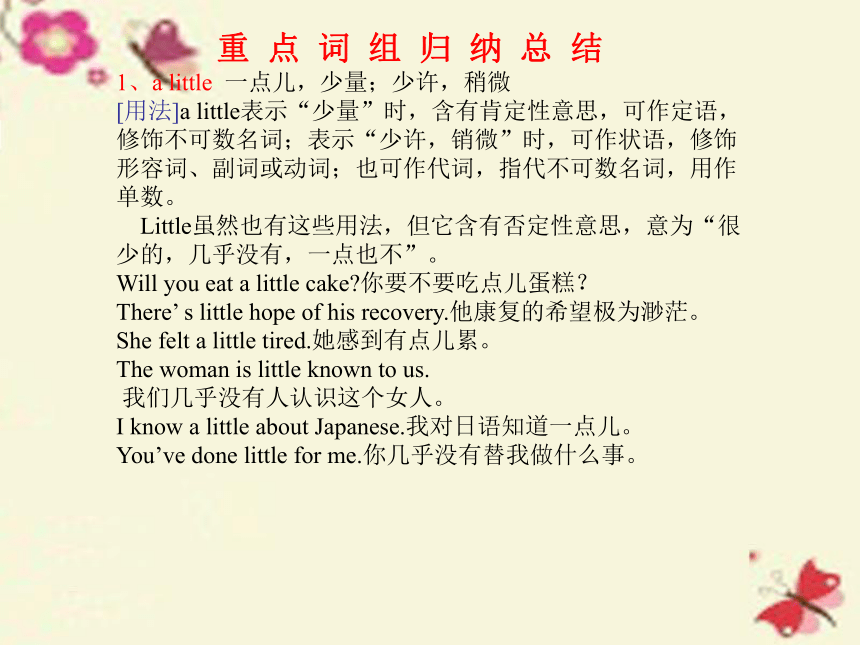
文档简介
课件88张PPT。初中英语第一轮复习
常考知识点 (之一) 初中英语第一轮复习教案与计划安排
总的目的与要求:
通过第一论复习,使学生全面掌握初中所学知识点;熟悉中考常考点,通过例题,使学生把握常考点的命题角度.
2. 教学方法: 探讨式. 给出知识点,让学生进行总结.
3. 材料来源:
以深港版为主,利用人教版进行知识拓展.
4. 教学容量: 每节课讲述10点,课前用10分钟讲述练习.
5. 作业布置: 每天配备一张与之配套的练习题.
6. 教授对象: 初三 (1), (2)
7. 教学后记: 主要检查学生作业中知识点的落实问题,在下一堂课前进行评讲. 中考热点总结
初中教学大纲对词法的基本要求是:
(1)掌握所学单词的形态变化。
(2)掌握动词的五种基本时态
(一般现在时、一般过去时、一般将来时、
现在进行时和现在完成时)的基本用法。
(3)掌握动词不定式作宾语、宾语补足的用法。
英语有十大词类,其中名词、形容词、数词、代词、
副词和动词具有实际意义,能够单独使用,
称为实词;冠词、介词、连词和感汉词没有实际意义,
不能单独使用,称为虚词。下面分类介绍。1.名词:主要考查名单复数、不可数名词、名词所有格、主谓一致、量词短语和既作作可数又可作不可数的名词。
2.开容词:主要考查形容词的比较级和高级、同级比较as…as不同级比较not as/so…as,比较级和最高级之间的相互转换和近义词的辨析等。
3.数词:主要考查基数词和序数的用法、数词的读尖、
hundred ( thousand, million )和hundreds (thousands, mil-lions ) of的区别、分数词以及序数词表示“又一”的用法。
4.代词:主要考查人 称代词、物主代词、反身代词,不定代词和疑问代词的用法等。
5.副词:主要考查副词的作用、副词的比较和最高级、频度副词和近义词的辨析等。6.动词:主要考查近义词辨析、情态动词、短语动词、
瞬间动词、动词时态(一般现在时,一般过去时、
一般将来时和现在完成时)和非谓语动词(不定式和 v-ing形式)。
7.冠词:主要考查不定冠词a,an和定冠词the的用法以及不用冠词的几种情况。
8.介词:主要考查近义词的辨析及固定搭配等。
9.连词:主要考查并列连词(but, and, so, or等)和从属连词(that, if, when, what, who, because, after, as soon as, thought, though, as 等)的用法。 常 用 词 组
on duty a picture of my family
look at a map of China
look like the girl in the hat
look after give…to
It doesn’ t matter get on the bus on foot
a quarter to/past two by bus/bike/train…
be good at in the open air have a swim
on Mid-Autumn Day this/next time
help…with… I’ve no idea.
next to on the left/right
in the front/back row in the middle of
at the front/back a place called…go along…the cityof up and down keep healthy
in the same class go to the classroom put on go to bed
take off go home come in It’s your turn now.
a bottle/cup/glass of ride a bike take…to make a cake put…away fly a kite get down play basketball something to drink/eat
near the river Welcome back to school. a few a little a big/small piece of paper
look after yourself how often
less/more than three months ago later on
do eye exercises take a walk go on
take a message ring up
It’s a pleasure. give…a message
at the moment Happy birthday!Last from…to have a party at the end of
Go skating go for a walk turn on/off
Turn green get ready for at times
Be different from take-away food
By the way… something different
Which is the way to…? Take enough exercise
?Go on until…… instead of
on one’s way(to) No problem.
pull…out of What’s the matter?
put…up from be pleased
all by ourselves Nice talking to you.
no longer be on a visit to get dressed
too…to… all by herself/himself… at last
leave one by oneself look over stop doing
not…any more place(s) of great interest 重 要 句 型
1.How do you like China? 2.What’s wrong with…?
3.Would you like something to eat?
4.I don’ t think so. 5.What about…?
6.Don’ t worry. 7.What would you like?
8.How many bottles of milk 9.Do you want a go?
10.There are some hills in the picture.
11.May I borrow your… 12.I’d like you to meet…
13.It’ s time for…14、How do you usually come to school?
15、I usually come by bus. 16、You’d better catch a bus.
17、What day was it yesterday? 18、What was the date?
19、Could I speak to…,please? 20、Was there a message?
21、It’ s very cold today, isn’t it?
22、Lucy is younger than Jim.
23、She is the youngest of all.
24、What does your father do?
25、Where does he work? 26、What a strong wind!
27、How warm it is today! 28、Would you like…?
29、Which do you like better, pork or beef?
30、I like pork better than beef.
31、Which do you like best?
32、I like tomatoes best of all.
33、Excuse me. Which is the way to…,please?
34、When the lights are green, the traffic can go.
35、If you jump a queue, other people will not be pleased.
36、It’s too dangerous to cross.
37、I have to do some cooking.
38、Can you hear anything?
39、Help yourself to some cakes.
40、We bought granny a present, but she didn’t like it.
41、Is there a cat in the tree?
42、What are you doing? I’ m reading a book.
43、Are you writing? Yes, I am./No, I’m not.
44、What day is it today? It’ s Tuesday.
45、Do you have an eraser? Yes, I do./No, I don’t.
重 点 词 组 归 纳 总 结
1、a little 一点儿,少量;少许,稍微
[用法]a little表示“少量”时,含有肯定性意思,可作定语,
修饰不可数名词;表示“少许,销微”时,可作状语,修饰形容词、副词或动词;也可作代词,指代不可数名词,用作单数。
Little虽然也有这些用法,但它含有否定性意思,意为“很少的,几乎没有,一点也不”。
Will you eat a little cake?你要不要吃点儿蛋糕?
There’ s little hope of his recovery.他康复的希望极为渺茫。
She felt a little tired.她感到有点儿累。
The woman is little known to us.
我们几乎没有人认识这个女人。
I know a little about Japanese.我对日语知道一点儿。
You’ve done little for me.你几乎没有替我做什么事。[延伸]only a little只有一点点;
quite a little(口语)相当多的,颇多的;
not a little 不少的,相当多的,很多的。
—Do you know French?你懂法语吗?
—Yes, but only a little 懂,不过只懂一点儿。
I usually spend quite a little time on my English study.
我通常在英语学习上花相当多的时间。
He has given us not a little trouble.
他给我们带来了不少麻烦。
After a long day of work.,I felt not a little tired.
工作了一整天,我感到很累。
2、a few一些,少数几个
[用法]a few 含有肯定性意思,可作定语,
修饰复数名词;也可作代词,视为复数,表示“少数人
或物”。特指一物体时,用the, his, her等来代替a。
few虽然也有这些用法,但它含有否定性意思,
意为“很少的,几乎没有”。
There’re a few differences between the two languages.
这两种语言之间有一些差异。
Few people can live to be 100 years old
.很少人能活到100岁。
I’ve seen a few of these old films.
这些老影片我看过一些。
Very few know the old love song.
很少人知道这首老情歌。
[延伸]only a few 仅少数,只有几个;quite a few(口语)
相当多;not a few不少的,相当多的。
Only a few of them have been to the West Lake in Hangzhou.
他们当中只有几个人到过杭州的西湖。
You’ ll have to wait quite a few weeks.你必须等上好几个星期。
Not a few people have made that mistake, but most of them forget it.
不少人犯过这种错误,但其中大多数都忘了。
a lot of 许多,大量II a lot很,非常。
[辨析]a lot of等于lots of,口语,用于肯定句中,比many和much
(用于否定或疑问句中)更普遍,常作定语,修饰可数或不可数
名词。A lot 当副词用时,相当于very much;也可作名词,多用于
口语中,表示数量。
A lot of people went swimming yesterday.昨天很多人去游泳。
A lot of work is to be done this week.本周有很多工作要做。
She’ s feeling a lot better now.她现在感觉好多了。
The boy knows a lot about history.这个男孩懂得很多历史方面的东西。3、all right好;行;不错
[用法]作形容词时,多作表语。也可用作副词。
常见用法有:
(1)健康良好的,不要紧
You’ll be all right after taking this medicine.
吃了这药以后你就会好的。
—You look pale. Are you all right?
你看起来脸色苍白,不要紧吧?
—I’ m all right, thanks.不要紧,谢谢。
(2)令人满意的,不错的
Is it all right with you?这对你方便吗?
—Do you like the wine?你喜欢这酒吗?
—It’s all right.还真不错。
(3)健康地,安好地
She’s getting on all right.她的日子过得挺好的。(4)顺利地,不错
Did you catch the train all right?
你顺利地赶上火车了吗?
He’ s doing all right.他做得不错。
(5)好的(用于对答)
—Can you call me up tonight?
今晚你给我打电话好吗?
—All right. What time?好的,几点打?
(6)知道吗?好吗?(用于确认对方是否理解)
Take one pill after each meal, all right?
每顿饭后吃一片药,知道了吗?
4、at work(人)在工作,(机器)在运转;
(因素)在起作用;从事于,忙于
My father is at work now.我父亲现在正在上班。
All the machines in the factories are at work
even during the holidays.
即使在节假日,工厂里所有的机器也都在运转。
Are the new rules at work?这些规定起作用了吗?
I’ m at work on/upon a new handbook thee months.
这几个月我在忙着写一本手册。
5、be from从……来;是……人
come from来(自);出生(于)
Where are you from?
( = Where do you come from?)你是哪里人?
Light comes from the sun.光来自太阳。6、be over结束
[用法]over在这里是形容词,其后不跟任何成分。
So much for today. Class is over.
今天就讲到这里,下课。
Hand in your compositions when school is over.
放学时,把你们的作文交上来。
7、best of all 最
[用法]副词词组,作状语。
My younger brother likes tennis best of all.
我弟弟最喜欢网球。
Which do you like best of all, English, history or maths?
英语、历史和数学,你最喜欢哪一科?
8、come in进来 come out 出来
[辨析]二者都是不及物动词短语,意思相反。
Come in表示“进来”,表示“进入……”时,
用come into; come out表示“出来”。
表示“从……出来”时,用come out of。
May I come in?我可以进来吗?
He came into my room without knocking
他没有敲门就进入了我的房间。
The moon has come out.月亮出来了。
He came out of her house and disappeared in the dark.
他从她的房子里面走出来,消失在黑暗中。
come over(to )过来;顺便来访 come around(走)过来
[辨析]二者都有“过来;来访”之意,
都是不及物动词短语,
come over表示“从远处来;顺便来访”,若跟宾语,
须加介词to、from等;come around等于come round,
表示“迂回而至;随兴来访”,若跟宾语,常用to。
When did you come over to Zhengzhou?
你是何时来到郑州的?
Come over here and give me a hand.
到这儿来,帮我一个忙。
They came over from the North to see us.
他们从北方远道来看望我们。
I’ve been so sorry you couldn’ t come around this week.
你这星期没能过来,我感到很遗憾。
Can I come around to your home?我今晚到你家去好吗?9、get down下来;落下
[用法]作不及物动词短语时,有“下来,落下”之意;
作及物动词短语时,有“写下,取下”之意,
但不用被动语态。
The cat climbed the tall tree and couldn’ t get down.
猫爬到高树上,但是下不来了。
A little bird got down from the roof of the house.
一只小鸟从房顶上落下来了。
Please get down the message.请把这个口信写下来。
Will you please help me get the box down from the shelf?
请你帮我把这个箱子从架子上取下来好吗?
10、get on上车
[用法]不用被动语态,和get off相反。
表示“上车/飞机/船;骑上自行车/马”等,
可跟宾语,也可单独使用。
The ticket conductor asked me whether I’ d got on
at Luoyang or Zhengzhou.
检票员问我是在洛阳上的车还是在郑州上的车。
She got on her bicycle and ran off.她骑上自行车就跑掉了.
I’ll hold your horse while you get on.
你上马时,我为你牵着。
[警示]
例 Jack got his leg hurt when he the horse.
A. got off B. got down C. got on D. got out of分析与解答:本题考查动词组的辨异。
get off(μt.)(从汽车、飞机、自行车或马上等)下来;
get out of (μi.)从树上等)下来;
get on和get off直反;
get out of (从车里等)下来,从……里面出来。
杰克从马上下来时伤了腿,上马时一般不会致伤,
get out of 侧重“从车的里面出来”。故选A。
11、get to到达
[用法]表示“到达某地”时,get 作不及物动词,
不能单独使用。若后跟地点副词,不加to。
Write to me when you get to Xi’ an.到达西安时给我写信。
When they got to the top of the mountain,
the sun had already risen.
当他们到达山顶时,太阳已经升起来了。
When did you get home last night?
昨晚你是什么时候到家的?12、get up 起床 be up起床
[辨析]二者都有“起床”之意,get up强调动作,
为非延续性动词;be up强调状态,可延续。
When do you usually get up in the morning?
你早上通常什么时间起床?
—Are you up, Tom?汤姆,你起来了吗?
—Yes, I’ve been up for an hour.
是的,我已经起床一个小时了。13、go to bed睡觉 in bed睡着
[辨析]二者都有“睡觉”之意。Go to bed 指“上床去睡觉”,
强调动作;in bed指“在睡觉,在床上,卧床”,
表示一种状态。
I’m so sleepy and I shall go to bed now.
我很瞌睡,现在就想睡觉。
He is still in bed.他还在睡觉。
He stayed in bed till 8 this morning.
今天早上他一直睡到8点。
Jane is in bed with a bad cold.
简因患重感冒而卧床不起。
[警示]
例 Jim entered his bedroom and placed his schoolbag .
A. in bed B. in the bed C. on bed D. on the bed 14、how many多少 how much多少
[辨析]二者都有“多少”之意,
how many修饰复数名词或表示复数含义,
how much修饰不可数名词或一月示单数含义。
How many people are there in your family?你家有几口人?
How many of you are going to the concert?
你们有几个人要参加音乐会?
How much is a ticket?一张票多少钱?分析与解答:本题考查用不用冠词的不同含义。
涉及到“卧床;睡觉”时,bed前通常不用冠词;
表示“床”时,bed前常用冠词。没有on bed这样的词组;
in bed表示“卧床;睡觉”;应用on the bed,故选D。15、not…at all根本不 at all全然
[辨析]at all用于条件句中,起强调作用,
表示“到底,竟然”。用于否定句中,
即not…at all,表示“根本不,一点儿也不”。
I’m surprised that you came at all.
你竟然来了,我感到惊奇。
I’ m sot at all satisfied with my son’s homework.
我对儿子的作业一点儿也不满意。
16、pet…away把……收起来(放好);存储;打消
[用法]及物动词短语,宾语可放在中间或后面。
Put your books away when school is over.
放学时,把你的书收起来放好。
He puts a little money away every week for his grandchildren.
他每周都为孙子们存一点儿钱。
Put away these foolish ideas!打消这些愚蠢的想法吧![警示]
例 If you have finished with those tools,
I wish you’d where you get them.
A. put them off B. put them away
C. put them right D. put them back分析与解答:本题考查动词词组的辨异。
Put off 推迟,延期,让……下车,关掉;
put away收起来,存储,打消;
put right纠正,修理好;
put back放回原处,推迟,使返回。
该题题意是:用完工具后,要放回原处。故选D。
17、put on穿上(衣服);戴上(帽子等)
get dressed穿衣服
[辨析]二者都有“穿衣”之意,pet on为及物动词短语,
可表示“穿衣、戴帽;擦粉;上演,演出”;
get dressed为系表结构,表示“穿好衣服”,其后不跟宾语。
He put on his coat and hat and then went out.
他穿上大衣,戴上帽子,然后就出去了。
He put on too much face power.玛丽脸上擦的粉太多了。
We’ re putting the play on at Fenghuang Theater
next Sunday.下周日我们打算在凤凰剧院上演这场戏。
Now you get dressed and go out and try your luck.
现在你穿了衣服,到外面去碰碰运气。
[延伸]be dressed in穿着……(状态);
dress oneself in穿着……(动作)
The lady was dressed in white at the party.
那位女士在聚会上穿着一身白衣服。
She dressed herself in a large blouse.她穿着一件大罩衣。
18、teach oneself 自学
[用法]不及物动词短语,表示“自学……”时,
用teach oneself sth.,相当于learn sth. by oneself。
The boy began to teach himself at 10.
这个男孩10岁时开始自学。
I teach myself Japanese in my spare time.
(= I learn Japanese by myself in my spare time.)
业余时间我自学日语。19、very much很,非常
[用法]常作状语,修饰动词、副词或过去分词,
也可省去very。much修饰动词时,常用于疑问句、
否定句中。Very也有“很,非常”之意,常修饰形容词、
副词或形容词化的过去分词。
Thank you very much.非常感谢。
She very much likes fruit. ( = She likes fruit very much.)
她非常喜欢水果。
English is (very)much used in many countries.
英语在很多国家应用魏广泛。
You’re a very good cook.你是一位很好的厨师。
I got up very late this morning.今天早上我起床很晚。
I’ m very please to see you again.再次见到你我很高兴。
20、all the same仍然;(虽然……)还是
[用法]和just the same相同。作副词用时,多用于口语中,意为“仍然,还是”。作形容词用时,意为“都一样,无所谓”。
It was raining hard, but we got there in time all the same.
那时下着大雨,但是我们还是准时到达了那里。
Thank you all the same.尽管如此,还是要谢谢你的。
(婉谢对方好意时用语)
He often gives us a lot of trouble
— but I like him all the same.
他常常给我们添很多麻烦,可是我还是喜欢他。
You can stay or leave now; it’s all the same to me.
你现在留下也好,离开也好,对我来说都一样。
21、all the time 总是,一直
[用法]副词词组,作状语。
She kept crying all the time.她一直哭着。
Conditions are changing all the time.情况不断地在变化。
22、at times 不时,有时
[用法]副词词组,等于sometimes。
At times I go to the beach.有时候我到海滩去。
I come to school late at times.有时,我来学校晚。
[延伸]at all times 无论何时,一直
They were ready at all times to make attacks on the ene-my.
他们时准备向敌人发起进攻。
23、at night 在夜里,天黯地 in the night在夜间
[用法]at night指在一天的部分时间,
常常是下午六时至午夜这一段时间;
in the night指从天黑到天明这一整段时间。
He stole away at night, leaving a letter on my table.
夜里,他在我的桌子上留下一封信就溜走了。
I often wake up several times in the night.
我常常在夜间醒好几次。24、be careful 小心;当心;谨慎
[用法]可单独使用,也可跟介词(about/of/with)、
不定式或从句。跟不定式时,通常用否定形式;
跟从句时,往往要省掉介词,且从句不用将来时。
Be careful when you cross the street.过马路时要小心。
She is careful about/of her food.
(= She is careful what she eats.) 她很注意饮食。
Be more careful with your work.对你的工作要更加谨慎。
You must be careful not to break anything.
(= You must be careful that don’t break anything.)
你必须小心,不要打破任何东西。
25、be good at 在……方面做得好;善于
[用法]后跟名词,be bad for与之相反。
Vegetables are good for you.蔬菜对你有好处。
It wouldn’t be good for her health.
这对她的健康不会有什么好处。
He is good for nothing.他这个人没能什么用处。
This ticket is good for three days.这张票三天内有效。
[延伸]do good to (= do…good)对……有益;
as good as 和……一样
More exercise does god to your health.
多锻炼对身体有益。
He is as good as deaf.他几乎和聋子一样。
27、be late for迟到
[用法]后跟名词,表示“干……迟到了或晚了”,
和come late to(侧重动作)同义。
I’m never late meeting yesterday.他昨天开会来晚了。
[延伸]be late (in ) doing…做……迟了。
Sorry, I’m late (in) arriving.对不起,我晚到了。28、find uot找出;查明
[用法]后跟名词、代词、宾语从句或“疑问词+不定式”。
We must find out the truth of the matter.
我们必须查明事实的真相。
I’m sure I’ll find it out as soon as possible.
我保证我会尽快把这件事查清楚的。
She found out how much the house would cost.
她弄清了这所房子会值多少钱。
He will soon find how to drive the car.29、hove a good time玩得很高兴;过得很愉快。
[用法]其中的a不能省略,good可以换为nice,happy
或wonderful等而意思不变,该词组与enjoy oneself同义。
These girls had a good time at the ball.
这些姑娘在舞会上玩得很开心。
Have a good time in Beijing !祝你在北京玩得高兴!
If there were no exams at school,
we would have a much happier time.
假如学校没有考试,我们会过得愉快得多。
[延伸]have a (hard)time doing做……有困难/费劲
John had a (hard) time passing his maths exam.
约翰通过数学考试有困难。
Poor Susan had a hard time trying to get the children
to go to bed.
可怜的苏珊费了很大劲才把这些孩子打发睡觉。30、how often 多长,多长时间
[用法]表示频率,它与how soon (多久以后,还要多久),
how long (多长时间)容易混淆。
—How often do you go shopping?你多长时间购一次物?
—Once a week.每周一次。
How often do the buses run?公共汽车多长时间一班?
How soon can you be ready?再过多久你能准备好?
How long have you stayed here?你呆在这里多长时间了?[警示] 例 We don’t know you will finish all the task.
A. how soon B. how long C. how often D. how much 分析与解答:本题考查固定词组的辨异。
How soon(表示时间)多久,how often (表示频率)
how long (表示时间)多久(一次)多长时间(一次);
how much(表示数量或程度)多少。该题问的是:
再过多久才能完成所有的任务,故选A。31、at the front of 在……的前面 in front of在……前面
at the head of 在……的前面
[辨析]三者意思接近,at the front of 和in the front of ,
at the head of 的意思相同,都表示“在同一范围内
的…前面部分”;in front of 表示“在…范围以外的前面”。
She sat at/in the front of the bus.她坐在公共汽车的前面。
There is a beautiful garden in front of my house.
我的房前有一个漂亮的花园。
I put my address at the head of the letter.
我把我的地址写在信的最前头。
32、keep healthy 保持健康
be healthy 健康的
[辨析] 二者都有“健康”之意,都是系表结构。
Keep healthy表示“保持健康”,侧重动作;
be healthy 表示“(是)健康的”,侧重状态。
Morning run helps to keep healthy.
早晨跑步有助于保持身体健康。
Though the old man is more than80,he is very healthy.
这位老人虽然80多岁了,他还是很健康。33、kinds of 各种各样的
[用法]修饰可数名词,该名词多用复数形式,也可用
单数形式,和all kinds of 相同。前面可以加different .
many或数词,表示“不同种类/多种/几种……”。
You can see (all) kinds of animal (s) in Beijing Zoo.
你可以在北京动物园里看到各种各样的动物。
English and Chinese are two different kinds of language(s).
英语和汉语是两种不同的语言。
There are many kinds of tree(s)in this park.
这个公园里有很多不同种类的树。
34、look after照顾;照看
take (good)care of(好好;细心)照顾;保管
[辨析]二者都有“照顾,照看”之意,可互换。
Take care of还有“注意……;保管……”之意。
Don’ t worry, I can look after myself.
别担心,我能照顾我自己。
These old men are well looked after here.
这些老人在这里被照顾得很好。
Who tskes care of the pet?谁照看这个宠物?
Take care of your health.注意你的身体。
35、next to贴近;其次
[用法]可作定语、表语、状语
In one room next to his I found a lot of old clothes.
在挨着他的一个房间里我找到了很多旧衣服。
The chemistry lab is right next to the library building.
化学试验室就挨着图书馆。
New York is the largest city next to London.
除了伦敦,纽约是最大的城市。36、next+时间 the next+时间
[辨析]二者都表示将来。“next+时间”指从现在算起,
“the next+时间”指从过去算起。
I shall go there next Friday.下星期五我要到那里去。
He came here again the next morning.
第二天早上他又到这里来了。37、by bike/bus/plane/ship
骑自行车/乘公共汽车/坐轿车/乘飞机/乘轮船
[用法]这组词都表示交通方式,其公式是
“by+交通工具名词”,作状语,名词前均不加冠词
或其他修饰词。若这一类交通工具名词在动词后宾语
或表示特殊意义时,名词前可用冠词或其他修饰词。
I usually go to school by bike, but sometimes
by bus or by taxi.
我通常骑自行车去上学,但有时也坐公共汽车或打的。
—No.By plane、不,坐飞机。
I took a taxi to the airport.(= I went to the airport by taxi.)
我是打的去机场的。
Shall we go there by car/in a car/ in my father’s car?
我们坐轿车/坐我爸爸的轿车到那里去吗?
38、on one’s/the way home(在)回家的路上
[用法]此为“on one’s/the way to+地点名词“结构,
one’s和the可互换。若地点为副词,不加介词。
I met Jane on my/the way home.
我在回家的路上见到了筒。
He was on the/his way to the airport
when his car broke down.
他在去机场的途中,车出了故障。
[延伸]on one’s/the way to do 在去做……的路上;
on one’s/the way to doing逐渐做……
The girl had all her money stolen
on the/her way to buy a bicycle.
这个女孩在去买自行车的路上,她所有的钱被人偷了。
He is on the/his way to getting well.他正逐渐痊愈。39、out of 向…外;在…之外;…中(间)有…;
由…做成;失去 [用法]介词词组。
She went out of the room with some flowers.
她拿着一些花从房间里走出来了。
Don’t look out of the window in class.
上课时不要向窗外看。
He lives a few miles out of the city.
他住在离市区几英里外的地方。
Nine out of ten people will agree with what you said.
十个人中有九个会同意你说的话。
She made the basket out of bamboo.
她用竹子编了这个篮子。
We are out of water now 我们这里现在停水了。
She and her husband have been out of work for two years.
她和丈夫失业两年了。40、first先,首先,at first起初
[辨析]二者都有“首先”之意,
first是副词,指几件事中所述事情位于前列;
at first指一件事的开始状况,
并往往含有后来有变化的意思。
First we must take the blame.
首先,我们必须把过错承担起来。
At first things here seemed to be all right.
开始这里的情况似乎很正常。41、at last最后;终于 in the end 最后;终于 finally 最后
[辨析]三者都有“最后,终于”之意,
at last指经过困难或挫折,强调达到目的所尽的努力;
in the end 可以指将来,而at last则不行;
finally指一系列事物或论点的顺序,用于动词之前,
at last也有此意,但期待的感情更强烈。
In spite of the heavy rain, we have at last arrived,
尽管下大雨,我们最后还是到了。
He tried many times to pass the exams,
and at last he succeeded.
他多次试图通过考试,最后总算成功了。
All will come right in the end.到头来一切都会好的。
Finally we went to visit the famous star.
最后我们去拜访了那位著名的影星。
After a long time, they finally found the lost child.42、at the end of在……尽头
[用法]指在某物的末端、时间和动作的末尾或结束时。
You can find the hospital at the end of the street.
你可以在这条街的尽头找到那家医院。
Some students are planning to go at the end of the term.
有些学生计划期末走。
Hand in your homework at the end of the lesson.
本节课结束时交作业。
43、be different from和……不同
[用法]表示“和……大不相同”时,用quite修饰different,
该词组和be the same as意思相反。
My house is different from yours in several ways.
我的房子在一些方面和你的不同。
He is quite different from what he was 10years ago.
他和10年前的他截然不同。44、be in hospital (生病)住院
[用法]hospital在此为抽象名词,其前不加冠词。
美国英语中用be in the hospital。
How long has she been in hospital?她住院多久了?
The driver is still in hospital.那个司机还在住院。
45、be far from远了 be quite near (to)相当近
[辨析]二者词义相反,注意介词的不同。
The sun is far from the earth.太阳远离地球。
How far is it from here to her house?
从这里到她家有多远?
My office is quite near to the railway station.
我的办公室离火车站很近。
46、be/feel worried担心;感到忧虑
[用法]系表结构,后面可跟about(对……担忧)或从句。
She is very worried about her sick mother.
她非常为生病的妈妈担心。
The child felt worried that his father would leave him soon.
这孩子担心爸爸很快离开他。
47、for example例如
[用法]副词词组,用于列举成分,可放在句首、
句中或句末,缩写为e.g.
The differences in spoken language between American
English and British English are greater. For example,
Americans say dance[daens],and in England
they say[da:ns]
美国英语和英国英语在口语方面的差别较大,
例如林肯和爱迪生。48、get ready for为……准备好
[用法]get ready for等于make ready for(强调动作),
和be ready for(强调状态)相同,后跟名词或代词。
She has got ready for the meeting.
她已经为开会做好了准备。
Are you ready for the work?你准备好动手工作了吗?
[延伸]get ready to do 准备好做……;
get…ready 把……准备好
I have got ready to start. 我已经准备好出发了。
Mother is getting dinner ready妈妈在准备饭菜。
49、go on继续;进行等 [用法]不及物动词短语,
表达“(向前)进行,(时间)经过或过去”,
也常用go on with sth..和go on doing sth.结构
表达“继续(做)某事”。
We were all tired out, so we couldn’t go on.
我们都累坏了,所以不能往前走了。
I haven’ t finished my homework,
so I have to go on with it tomorrow.
我没有做完作业,所以明天还得继续做。
He went on working without taking a rest.
他没有休息就继续工作了。
As the days went on, he still didn’ t come back,
日子一天在过去了,他还没有回来。[延伸]go on to do 接着做…
(指做完某事后接着做了另一件事)
So much for the text. Now let’s go on to do some exercises.
课文就学到这里,现在我们接着做一些练习。
[警示]
例 The professor went on ___ the world situation
after he gave a speech on the home situation.
with B. to talk about
C. talking about D. with talking about
分析与解答:本题考查go on后跟不定式、
分词和with介词短语的不同。教授谈完国内形势后,
接着又谈世界形势,属于两个不同的话题,
应用go on to talk about.故选B。
50、have to 必须;不得不
[用法]常被视为情态动词,后面直接跟动词原形。
它的疑问句和否定句形式通常借助do.
Other problems also have to be solved as soon as possible.
其他问题也必须尽快解决。
You don’ t have to worry about the pay.
你不必为报酬担心。
Do you have to leave so soon?你必须这么快就离开吗?
[警示]
例 They will have to hand in their English compositions
by the end of this week , ?
A. haven’t they B. don’ t they
C. won’t they D. have they分析与解答:本题考查have to 的反意疑问句形式。
have to 的疑问句、否定句或反意疑问句形式可
借助于助动词do;也可用其本身have,但这种用法
仅限于一般现在时和一般过去时。该题中,
have to用于将来时,因此应按行为动词处理,故选C。51、help oneself to…自用(食物等);擅自拿用
[用法]to为介词,后跟名词。若不跟宾语,
只用help oneself。若表达“给别人夹菜或拿烟等,
把oneself换为sb.。
Help yourself to some fish, please.请随便吃一些鱼吧。
My dictionary is over there on the bookshelf .
Help yourself, please.
我的词典在那边的书架上呢,请自己拿来吧。
May I help you to some more vegetables?
我给你多夹一点儿蔬菜好吗?
52、instead作为代替 instead of 代替;顶替
[辨析]二者都有“代替”之意,instead 为副词,
其后不跟什么成分常置于句尾,也可置于句首
引起一个新的句子;instead of 为介词短语,
后面常跟名词、代词、动名词或介词短语等。
翻译成汉语时,译法较灵活。
Last summer I went to France.
This summer I’m going to London instead.
去年夏天我到法国去了,然而今年夏天我打算去伦敦。
Many people think she is not honest.
Instead, she has never told a lie.
很多人都认为她不诚实,可她从来没有撒过谎。
I’ve come here instead of my brother, for he is ill
我替我哥哥来了,因为他病了。[警示]
例 If Harry is not well enough to go with you, take me .
A. instead of B. instead
C. in stead D. in the steadYou should be out playing instead of watching TV in-doors.
你应该到外面玩耍,不要呆在家里看电视。
He always studies in the evening instead of during the day.
他总是晚上学习白天休息。
分析与解答:本题考查instead和instead of的不同。
该题中,空白后无其他成分,应用副词instead。故选B。53、later on 后来;以后
[用法]副词词组,作时间状语。表示“后来”,多用于一般过去时态中;表示“以后”时,多用于将来时态中。
Later on he got a job as a repair worker.
后来他找到了工作,当了修理工。
You will find this book useful to you later on.
以后你会发现这本书对你有用的。
Can we talk about it later on?我们对后谈这件事好吗?54、laugh at 嘲笑…;“因…而发笑或听了…而发笑”;
对…一笑了之
[用法]及物动词短语,用于被动语态时,
介词at不能丢掉。
表示“因……而发笑或听了……而发笑”时,
介词at表示事出的原因。
It’s bad manners to laugh at a person who is in trouble
.嘲笑困难中的人是不礼貌的。
Everyone hates being laughed at in public.
人人都讨厌当众被嘲笑。
They all laughed at my story.
他们对我的故事只是一笑了之。
55、look over 查看;(医生)检查;复习;审阅
[用法]及物动词词组,over为副词。
I’m going to look over a house I’m thinking of buying.
我打算去看看我在考虑购买的房子。
He asked my age, height, and looked me over.
他询问了我的年龄、身高和体重,然后给我检查了一遍。
Go over your lessons before you forget them.
趁你还没有忘掉功课的时候把它们复习一下。
Would you please look over my papers?
请你为我审阅一下论文好吗?
56、stop doing停止做…… stop to do停下来去做……
[辨析]stop doing 表示“停止原来正在做的事情”;
stop to do 表示“停止某事去做别的事情”。
He stopped smoking.他停止抽烟
He stopped to smoke.他停下来去抽烟[警示]
例 When they climbed up to the mountain, they were tired,so they stopped .
A. having a rest B. to have a rest
C. for having a test D. to a rest分析与解答:本题考查stop后跟不定式和名词的不同含义。根据题意“他们爬上山时,感到累了,
于是停下来休息一下”,此处应用不定式表示目的,故选B。若用for a rest表示目的也是正确的。57、no longer 不再 not…any more不再
[辨析]二者都有“不再”之意,
no longer (=not…any longer)强调数量或程度上的对比。
Mr.Wang doesn’t work here any longer.
(=Mr. Wang no longer works here.)
王先生已不在这里工作了。
Please don’t say any more about this matter.
(= Please say no more about this matter.)
请不人对这件事再说什么了。
58、pick up拾起;捡起;开车接(某人),收听(广播)
[用法]常用作及物动词,up为副词。
I picked up a wallet on my way to school this morning.
今天早上我在上学的路上拣到一个钱夹。
Shall I pick you up at the railway station at 4 this afternoon?
今天下午4点钟我开车在火车站接你好吗?
If you have a short-wave radio,
you can pick up the BBC English programmes.
如果你有一部短波收音机,你就可以收听BBC英语节目了。
59、ring up 给……打电话
[用法]up为副词,该词组与call up, telephone或phone相同。
Could you ring me up as soon as you arrive in Shanghai?
你一到上海就给我打电话好吗?
Have you rung up the airport to book a ticket to Shenzhen
for tonight?
你是否已经给机场打电话订好了今晚去深圳的机票。
If you can’t come, ring up and let me know.
如果人不能来,打个电话告诉我。
[延伸]ring off挂断电话;
ring for打电话找或要……;ring back回电话。
He rang off before I could ask his name.
我还未来得及问他的名字,他就挂断了电话。
Tell Jack to call me back later on, OK?
告诉杰克过一会儿给我回个电话,好吗?60、work hard 努力工作;干活卖劲儿
[用法]不及物动词短语,后眼宾语时,须加介词at。
The have been working hard all day long.
他们辛苦工作了一整天了。
The students here all work hard at their lessons
.这里的学生学习功课都很努力。
61、turn…on开;旋开
[用法]及物动词短语,on 为副词。
可经指打开自来水、燃气等,
也可以指旋开电灯、电视、收音机等电器。
它和turn off 相对。
Don’t turn on the water tap. Something is wrong with
it.别开水龙头,它出毛病了。
It’s already dark, why don’t you turn on the light?
天己经黑了,你为什么不开灯呢?[警示]
例I can’t hear the actors clearly.
Would you please________ the TV a little?
A.turn on B .turn down
C. turn off D. turn up
分析与解答:
本题考查turn 和不同副词构成的词组的不同含义。
turn on 打开(煤气、自来水、电灯等),turn off和
turn on 相反;turn up 把声音开大,把力量加大,
turn down 和turn up相反。语境告诉我们:
我听不清演员说的话,请把电视机的音量开大一点儿。故选D。62、wake up 醒(来);叫醒
[用法]up 为副词。
She usually wakes up early in the morning.
她早上总是醒得很早。
Please wake me up at six tomorrow.
明天早上6点钟叫我起来。
Ⅱ、主要句型用法点拨
1、? color sth.+颜色给……着色;把……染成……颜色
[用法]color作及物动词,后跟宾语或复合宾语结构。
Take out your paints and colour this picture.
拿出颜料,把这幅画着上颜色。
She colored her hair golden.她把头发染成了金色。
Please color this wall blue.请把这墙刷成蓝色。 2. let sb. do…让/允许/听任某人干……
[用法]let为使役动词,后跟不带to的不定式作宾补。
Let’s do≠Let us do, let’s do含有“咱们一起干”之意,包括对方在内,其反意疑问句句尾用shall we;Let us do是请求听者允许,意为“(你)让我们干”,不包括对方在内,其反意疑问句句尾用will you。另外,let往往不用于被动语态中,若要表示此意,可用allow或其他同义词的被动形式替换。该句型的否定形式常用don’t构成,但Let’s not do 这种
形式也很常见。Mum, you’re ill.
Let me get the doctor for you.
妈妈,你病了,让我为你请医生。
Let’s not think about it any more.
咱们别再想这件事吧。
Let’s go swimming, shall we?
咱们去游泳好吗?
Let us have a rest, will you?
让我们休息一会儿,好吗?
Middle school students are not allowed to smoke.
(不说…are not let to smoke.)中学生不准抽烟。 [警示]
You’re too careless. I won’t you to use my car any more.
A. let B. make C. allow D. have3. It’s time to do…该做…了 It’s time for…是…的时候了
[用法]It’s time 后可跟不定式或“for+名词”结构,
有时用It’s time for sb. to do,即“该某人做…了”。
It’s time to begin our class.我们该上课了。
His talk was over,it was time for him to be off.
他的话说完了,该离开了。
It’s time for breakfast/school.该吃饭了/该上学了。分析与解答:本题考查动词的辨异。
使役动词let ,make 和have后跟不定式作宾补时,
不带to,由此就可排除A、B、D三项。
Allow sb.to do 允许某人做。故选C。 4.? I’d like/love+sth.我想要… I’d like/love to do我想做…
[用法]I’d=I should/would,主语为第二、第三人称时用
would;like= love。该句型可跟名词或不定式作宾语。
I should like a word with you.我想跟你谈谈话。
I’d like to have some more rice.我想吃一些米饭。
Miss Li would not like to speak about it before me.
李小姐不想在我面前谈论这件事[警示]
例 Little Jim’d like to the theatre tonight.
A. to take B. taking C. to be taken D. taken分析与解答:本题考查would like/love后接宾语的形式。
Would like/love表示“愿望或喜好”,其后常跟名词、
代词或不定式,由此先排除B和D。take作“携带”时,
为及物动词,此处的主语little Jim和take之间为被动关系,故选C。 5. There be…某地有……
[用法]该句型表示“某处有……”或“存在某种情况”,
这是一个典型的倒装句型,be动词的单复数形式由其后
紧跟的名词的单复数形式决定,即主谓一致采且邻近原则。Be有各种时态形式。
There are 365 days in a year,aren’t there?
一年有365天,是吗?
There wasn’t anything interesting in yesterday’s newspapers.
昨天的报纸上没有什么有趣的东西。
There will be a good film at Dongfanghong Theatre to-night.
今晚在东方红剧院有一部好电影。
Isn’t there anything for me to do now?
现在没有我要做的事吗?
There have been great changes in our city since 1990
.自从1999年以来,我们城市发生了巨子的变化。[警示]
例 There were no other passengers besides two women
and three children on that bus that day, ?
A.were there B. weren’t there
C. were they D. weren’t they分析与解答:本题考查there be结构的反意疑问句形式。There be结构的反意问句的句尾附加部分要借助于there构成,由此先排除C和D。该There be结构的陈述部分为否定形式,其反意疑问句的句尾附加部分应用肯定形式,故选A。6、I like doing…我喜欢做……
[用法]like后跟动词作宾语,表示一般性或习惯性爱好
干某事。
I like reading short stories.我喜欢看短篇故事。
I don’t like discussing her behind her back.
我不喜欢在背后议论她。 7、I think…我认为……
[用法]其后多跟宾语从句,也可用作插入语。
I think you have done it quite well.
我认为你做得相当不错。
I don’t think he’s right.我认为他不对。
I thought Mother was coming to see me, but she didn’t.我原以为妈妈要来看我,可是她没有来。
It’s going to rain now, I think.我想现在要下雨。8、help sb. (to) do…帮某人做…
help sb. with sth.帮某人做…
[用法]第一个句型中作宾补的不定式带不带to均可,
美国英语中常不带to。第二年句型中with后跟名词。
I’ll help you (to ) solve the problem.
我会帮你解决这个问题的。
He often helps me with some housework.
他经常帮我做一些家务活。9、enjoy doing…喜欢干……
[用法]enjoy后不能跟不定式用宾语。
Most students enjoy listening to pop music.
大多数学生喜欢听流行音乐。
He enjoyed taking his sister for a walk along the river.
他喜欢带着妹妹沿河散步。 10、What about…?……怎么样?……怎么办?
[用法]What about…? = How about…?,
用来征求意见或询问消息,about后跟名词,代词或支名词。
Of course I’ll come.What about next Tuesday?
我当然会来。下周二怎么样?
What about another cup of milk?再喝一杯牛奶怎么样?
How about (our) going for a walk?(我们)去散散步如何?11、You’d better (not ) do…你最好(不要)干……
[用法]had better常被视为情态动词,其后直接跟动词原形,否定形式直接在其后面加not,有时had可省略,主语也可以由其他人称代词担任。
All these books had better be returned to the library on time.
Better telephone me as soon as you find him.
你最好一找到他就给我打电话。
Better not wait for him any longer.最好不要再等他啦。[警示]
例 What we if we want to improve our oral English?
A.did;have better do B. had;better to do
C. would;better do D. had;better do12、like…better than…与…相比更喜欢…,喜欢…胜过…
[用法]注意比较对象要一致。
I like English better than any other subject.
和其他任何一科相比,我更喜欢英语。
Mother likes music better than father ( does ).
妈妈比爸爸更喜欢音乐。分析与解答:本题考查had better后动词的形式。
had better通常作为一个情态动词,其后要跟动词原形,
由此先排除B。其一般疑问句形式要把had提至句首,
故选D。没有A、C两种形式。13、too+形容词/副词+to do太……而不能干……
[用法]该句型本身已含有否定意义,不定式不能再用
否定形式。不定式前可以有其逻辑主语“for sb”。若谓语为系动词,too后跟形容词;若谓语为行为动词,too后跟副词。
It is too late to do anything now.
现在太晚了,不能做什么事了。
This maths problem is too difficult for me to work out.
这道数学题太难了,我解不出来。
I walked too slowly to catch up with the team.
我走得太慢了,跟不上队。
You speak too fast for me to follow.
你说话太快了,我听不懂。
14、not…until 直到……才;在……之前(不)
[用法]until后既可跟短语,也可跟从句。
Don’t get off the bus until it has stopped.车停了再下车。
She didn’t begin to work until I had gone.我走后她才开始工作。[警示] Not until all the fish died in the river _____
how serious the pollution was.
A.did the villagers realize B. the villagers realized
C.the villagers did realize D.didn’t the villagers realize分析与解答:本题考查以not until开头的句子要用
部分倒装语序。如果not until后跟的是从句,until从句不能倒装。需倒装的是后面的主句,由此除B和C。not until从句已经使用了not,而D项中又用了否定形式,因此D不对,故选A。15、What+名词+主语+谓语!
How+开容词/副词+主语+谓语!
[用法]此为两个常感叹句型,若中心词为名词,用What开头,名词前常有冠词、形容词修饰;若中心词为形容词或副词,用How开头,有时,也可省略一些成分。
What a beautiful photo it is!多么漂亮的一张照片了啊!
How lovely the girl is!这个女孩金可爱啊!
How hard they are working!他们干活多么卖劲啊![警示] 例 from Beijing to London!
A.How long way it is B. What a long way is it
C. How long way is it D. What a long way it is分析与解答:本题考查感叹句的引导词以及感叹句的语序。该题中,中心词是名词way,应用what开头的感叹句,由此排除A和C。感叹句要用陈述语序,因此该题选D。16、so +be/have/助动词/情态动词+主语……也是如此
[用法]该句型表示前面所说的情况也适合后者,
是一种典型的倒装句。前面的句子必须是肯定的陈述句,be/have/助动词/情态动词的选择视前面的陈述句的谓语动词中的so换为neither或nor即可。
—I like playing football.我喜欢踢足球。
—So do I. 我也喜欢。
She is right and so are you.她对,你也对。
You didn’t do quite well in English last term.
Neither / Nor did Xiaohong.
上学期她在英语方面学得不好,小红也是这样。
[警示]
例 ---Do you know Jim quarreled with his brother?
---I don’t know, .
A.nor don’t I care B. nor do I care
C. I don’t care neither D. I don’t care also分析与解答:本题考查以含否定意义的副词neither,nor,hardly, never等开头的句子要用部分倒装语序,由此先排除C(若该选项为I don’t care either则是正确的)和D(also只用于肯定句中)。A项中,nor相当于neither,本身含有否定意义,助动词不能还再用否定形式,因此排除A而选B。 17、Why not+动词原形?为什么不做……呢?
[用法]用于提出建议或批评,相当于Why don’t you do…?
Why not go and ask Mr. Li for some advice?
为何不去向李老师求教呢?
Why not return it earlier?干吗不早点儿还呢?
18、something等+adj.
[用法]不定代词something, everything, anything, nothing
等被形容词修饰时,形容词要放在这类不定代词后面
作后置定语。
There is something wrong with my watch.
我的手表出毛病了。
—Is there anything new in today’s newspaper?
今天的报纸上有什么新鲜事吗?
—Nothing special.没什么奇特的事。
常考知识点 (之一) 初中英语第一轮复习教案与计划安排
总的目的与要求:
通过第一论复习,使学生全面掌握初中所学知识点;熟悉中考常考点,通过例题,使学生把握常考点的命题角度.
2. 教学方法: 探讨式. 给出知识点,让学生进行总结.
3. 材料来源:
以深港版为主,利用人教版进行知识拓展.
4. 教学容量: 每节课讲述10点,课前用10分钟讲述练习.
5. 作业布置: 每天配备一张与之配套的练习题.
6. 教授对象: 初三 (1), (2)
7. 教学后记: 主要检查学生作业中知识点的落实问题,在下一堂课前进行评讲. 中考热点总结
初中教学大纲对词法的基本要求是:
(1)掌握所学单词的形态变化。
(2)掌握动词的五种基本时态
(一般现在时、一般过去时、一般将来时、
现在进行时和现在完成时)的基本用法。
(3)掌握动词不定式作宾语、宾语补足的用法。
英语有十大词类,其中名词、形容词、数词、代词、
副词和动词具有实际意义,能够单独使用,
称为实词;冠词、介词、连词和感汉词没有实际意义,
不能单独使用,称为虚词。下面分类介绍。1.名词:主要考查名单复数、不可数名词、名词所有格、主谓一致、量词短语和既作作可数又可作不可数的名词。
2.开容词:主要考查形容词的比较级和高级、同级比较as…as不同级比较not as/so…as,比较级和最高级之间的相互转换和近义词的辨析等。
3.数词:主要考查基数词和序数的用法、数词的读尖、
hundred ( thousand, million )和hundreds (thousands, mil-lions ) of的区别、分数词以及序数词表示“又一”的用法。
4.代词:主要考查人 称代词、物主代词、反身代词,不定代词和疑问代词的用法等。
5.副词:主要考查副词的作用、副词的比较和最高级、频度副词和近义词的辨析等。6.动词:主要考查近义词辨析、情态动词、短语动词、
瞬间动词、动词时态(一般现在时,一般过去时、
一般将来时和现在完成时)和非谓语动词(不定式和 v-ing形式)。
7.冠词:主要考查不定冠词a,an和定冠词the的用法以及不用冠词的几种情况。
8.介词:主要考查近义词的辨析及固定搭配等。
9.连词:主要考查并列连词(but, and, so, or等)和从属连词(that, if, when, what, who, because, after, as soon as, thought, though, as 等)的用法。 常 用 词 组
on duty a picture of my family
look at a map of China
look like the girl in the hat
look after give…to
It doesn’ t matter get on the bus on foot
a quarter to/past two by bus/bike/train…
be good at in the open air have a swim
on Mid-Autumn Day this/next time
help…with… I’ve no idea.
next to on the left/right
in the front/back row in the middle of
at the front/back a place called…go along…the cityof up and down keep healthy
in the same class go to the classroom put on go to bed
take off go home come in It’s your turn now.
a bottle/cup/glass of ride a bike take…to make a cake put…away fly a kite get down play basketball something to drink/eat
near the river Welcome back to school. a few a little a big/small piece of paper
look after yourself how often
less/more than three months ago later on
do eye exercises take a walk go on
take a message ring up
It’s a pleasure. give…a message
at the moment Happy birthday!Last from…to have a party at the end of
Go skating go for a walk turn on/off
Turn green get ready for at times
Be different from take-away food
By the way… something different
Which is the way to…? Take enough exercise
?Go on until…… instead of
on one’s way(to) No problem.
pull…out of What’s the matter?
put…up from be pleased
all by ourselves Nice talking to you.
no longer be on a visit to get dressed
too…to… all by herself/himself… at last
leave one by oneself look over stop doing
not…any more place(s) of great interest 重 要 句 型
1.How do you like China? 2.What’s wrong with…?
3.Would you like something to eat?
4.I don’ t think so. 5.What about…?
6.Don’ t worry. 7.What would you like?
8.How many bottles of milk 9.Do you want a go?
10.There are some hills in the picture.
11.May I borrow your… 12.I’d like you to meet…
13.It’ s time for…14、How do you usually come to school?
15、I usually come by bus. 16、You’d better catch a bus.
17、What day was it yesterday? 18、What was the date?
19、Could I speak to…,please? 20、Was there a message?
21、It’ s very cold today, isn’t it?
22、Lucy is younger than Jim.
23、She is the youngest of all.
24、What does your father do?
25、Where does he work? 26、What a strong wind!
27、How warm it is today! 28、Would you like…?
29、Which do you like better, pork or beef?
30、I like pork better than beef.
31、Which do you like best?
32、I like tomatoes best of all.
33、Excuse me. Which is the way to…,please?
34、When the lights are green, the traffic can go.
35、If you jump a queue, other people will not be pleased.
36、It’s too dangerous to cross.
37、I have to do some cooking.
38、Can you hear anything?
39、Help yourself to some cakes.
40、We bought granny a present, but she didn’t like it.
41、Is there a cat in the tree?
42、What are you doing? I’ m reading a book.
43、Are you writing? Yes, I am./No, I’m not.
44、What day is it today? It’ s Tuesday.
45、Do you have an eraser? Yes, I do./No, I don’t.
重 点 词 组 归 纳 总 结
1、a little 一点儿,少量;少许,稍微
[用法]a little表示“少量”时,含有肯定性意思,可作定语,
修饰不可数名词;表示“少许,销微”时,可作状语,修饰形容词、副词或动词;也可作代词,指代不可数名词,用作单数。
Little虽然也有这些用法,但它含有否定性意思,意为“很少的,几乎没有,一点也不”。
Will you eat a little cake?你要不要吃点儿蛋糕?
There’ s little hope of his recovery.他康复的希望极为渺茫。
She felt a little tired.她感到有点儿累。
The woman is little known to us.
我们几乎没有人认识这个女人。
I know a little about Japanese.我对日语知道一点儿。
You’ve done little for me.你几乎没有替我做什么事。[延伸]only a little只有一点点;
quite a little(口语)相当多的,颇多的;
not a little 不少的,相当多的,很多的。
—Do you know French?你懂法语吗?
—Yes, but only a little 懂,不过只懂一点儿。
I usually spend quite a little time on my English study.
我通常在英语学习上花相当多的时间。
He has given us not a little trouble.
他给我们带来了不少麻烦。
After a long day of work.,I felt not a little tired.
工作了一整天,我感到很累。
2、a few一些,少数几个
[用法]a few 含有肯定性意思,可作定语,
修饰复数名词;也可作代词,视为复数,表示“少数人
或物”。特指一物体时,用the, his, her等来代替a。
few虽然也有这些用法,但它含有否定性意思,
意为“很少的,几乎没有”。
There’re a few differences between the two languages.
这两种语言之间有一些差异。
Few people can live to be 100 years old
.很少人能活到100岁。
I’ve seen a few of these old films.
这些老影片我看过一些。
Very few know the old love song.
很少人知道这首老情歌。
[延伸]only a few 仅少数,只有几个;quite a few(口语)
相当多;not a few不少的,相当多的。
Only a few of them have been to the West Lake in Hangzhou.
他们当中只有几个人到过杭州的西湖。
You’ ll have to wait quite a few weeks.你必须等上好几个星期。
Not a few people have made that mistake, but most of them forget it.
不少人犯过这种错误,但其中大多数都忘了。
a lot of 许多,大量II a lot很,非常。
[辨析]a lot of等于lots of,口语,用于肯定句中,比many和much
(用于否定或疑问句中)更普遍,常作定语,修饰可数或不可数
名词。A lot 当副词用时,相当于very much;也可作名词,多用于
口语中,表示数量。
A lot of people went swimming yesterday.昨天很多人去游泳。
A lot of work is to be done this week.本周有很多工作要做。
She’ s feeling a lot better now.她现在感觉好多了。
The boy knows a lot about history.这个男孩懂得很多历史方面的东西。3、all right好;行;不错
[用法]作形容词时,多作表语。也可用作副词。
常见用法有:
(1)健康良好的,不要紧
You’ll be all right after taking this medicine.
吃了这药以后你就会好的。
—You look pale. Are you all right?
你看起来脸色苍白,不要紧吧?
—I’ m all right, thanks.不要紧,谢谢。
(2)令人满意的,不错的
Is it all right with you?这对你方便吗?
—Do you like the wine?你喜欢这酒吗?
—It’s all right.还真不错。
(3)健康地,安好地
She’s getting on all right.她的日子过得挺好的。(4)顺利地,不错
Did you catch the train all right?
你顺利地赶上火车了吗?
He’ s doing all right.他做得不错。
(5)好的(用于对答)
—Can you call me up tonight?
今晚你给我打电话好吗?
—All right. What time?好的,几点打?
(6)知道吗?好吗?(用于确认对方是否理解)
Take one pill after each meal, all right?
每顿饭后吃一片药,知道了吗?
4、at work(人)在工作,(机器)在运转;
(因素)在起作用;从事于,忙于
My father is at work now.我父亲现在正在上班。
All the machines in the factories are at work
even during the holidays.
即使在节假日,工厂里所有的机器也都在运转。
Are the new rules at work?这些规定起作用了吗?
I’ m at work on/upon a new handbook thee months.
这几个月我在忙着写一本手册。
5、be from从……来;是……人
come from来(自);出生(于)
Where are you from?
( = Where do you come from?)你是哪里人?
Light comes from the sun.光来自太阳。6、be over结束
[用法]over在这里是形容词,其后不跟任何成分。
So much for today. Class is over.
今天就讲到这里,下课。
Hand in your compositions when school is over.
放学时,把你们的作文交上来。
7、best of all 最
[用法]副词词组,作状语。
My younger brother likes tennis best of all.
我弟弟最喜欢网球。
Which do you like best of all, English, history or maths?
英语、历史和数学,你最喜欢哪一科?
8、come in进来 come out 出来
[辨析]二者都是不及物动词短语,意思相反。
Come in表示“进来”,表示“进入……”时,
用come into; come out表示“出来”。
表示“从……出来”时,用come out of。
May I come in?我可以进来吗?
He came into my room without knocking
他没有敲门就进入了我的房间。
The moon has come out.月亮出来了。
He came out of her house and disappeared in the dark.
他从她的房子里面走出来,消失在黑暗中。
come over(to )过来;顺便来访 come around(走)过来
[辨析]二者都有“过来;来访”之意,
都是不及物动词短语,
come over表示“从远处来;顺便来访”,若跟宾语,
须加介词to、from等;come around等于come round,
表示“迂回而至;随兴来访”,若跟宾语,常用to。
When did you come over to Zhengzhou?
你是何时来到郑州的?
Come over here and give me a hand.
到这儿来,帮我一个忙。
They came over from the North to see us.
他们从北方远道来看望我们。
I’ve been so sorry you couldn’ t come around this week.
你这星期没能过来,我感到很遗憾。
Can I come around to your home?我今晚到你家去好吗?9、get down下来;落下
[用法]作不及物动词短语时,有“下来,落下”之意;
作及物动词短语时,有“写下,取下”之意,
但不用被动语态。
The cat climbed the tall tree and couldn’ t get down.
猫爬到高树上,但是下不来了。
A little bird got down from the roof of the house.
一只小鸟从房顶上落下来了。
Please get down the message.请把这个口信写下来。
Will you please help me get the box down from the shelf?
请你帮我把这个箱子从架子上取下来好吗?
10、get on上车
[用法]不用被动语态,和get off相反。
表示“上车/飞机/船;骑上自行车/马”等,
可跟宾语,也可单独使用。
The ticket conductor asked me whether I’ d got on
at Luoyang or Zhengzhou.
检票员问我是在洛阳上的车还是在郑州上的车。
She got on her bicycle and ran off.她骑上自行车就跑掉了.
I’ll hold your horse while you get on.
你上马时,我为你牵着。
[警示]
例 Jack got his leg hurt when he the horse.
A. got off B. got down C. got on D. got out of分析与解答:本题考查动词组的辨异。
get off(μt.)(从汽车、飞机、自行车或马上等)下来;
get out of (μi.)从树上等)下来;
get on和get off直反;
get out of (从车里等)下来,从……里面出来。
杰克从马上下来时伤了腿,上马时一般不会致伤,
get out of 侧重“从车的里面出来”。故选A。
11、get to到达
[用法]表示“到达某地”时,get 作不及物动词,
不能单独使用。若后跟地点副词,不加to。
Write to me when you get to Xi’ an.到达西安时给我写信。
When they got to the top of the mountain,
the sun had already risen.
当他们到达山顶时,太阳已经升起来了。
When did you get home last night?
昨晚你是什么时候到家的?12、get up 起床 be up起床
[辨析]二者都有“起床”之意,get up强调动作,
为非延续性动词;be up强调状态,可延续。
When do you usually get up in the morning?
你早上通常什么时间起床?
—Are you up, Tom?汤姆,你起来了吗?
—Yes, I’ve been up for an hour.
是的,我已经起床一个小时了。13、go to bed睡觉 in bed睡着
[辨析]二者都有“睡觉”之意。Go to bed 指“上床去睡觉”,
强调动作;in bed指“在睡觉,在床上,卧床”,
表示一种状态。
I’m so sleepy and I shall go to bed now.
我很瞌睡,现在就想睡觉。
He is still in bed.他还在睡觉。
He stayed in bed till 8 this morning.
今天早上他一直睡到8点。
Jane is in bed with a bad cold.
简因患重感冒而卧床不起。
[警示]
例 Jim entered his bedroom and placed his schoolbag .
A. in bed B. in the bed C. on bed D. on the bed 14、how many多少 how much多少
[辨析]二者都有“多少”之意,
how many修饰复数名词或表示复数含义,
how much修饰不可数名词或一月示单数含义。
How many people are there in your family?你家有几口人?
How many of you are going to the concert?
你们有几个人要参加音乐会?
How much is a ticket?一张票多少钱?分析与解答:本题考查用不用冠词的不同含义。
涉及到“卧床;睡觉”时,bed前通常不用冠词;
表示“床”时,bed前常用冠词。没有on bed这样的词组;
in bed表示“卧床;睡觉”;应用on the bed,故选D。15、not…at all根本不 at all全然
[辨析]at all用于条件句中,起强调作用,
表示“到底,竟然”。用于否定句中,
即not…at all,表示“根本不,一点儿也不”。
I’m surprised that you came at all.
你竟然来了,我感到惊奇。
I’ m sot at all satisfied with my son’s homework.
我对儿子的作业一点儿也不满意。
16、pet…away把……收起来(放好);存储;打消
[用法]及物动词短语,宾语可放在中间或后面。
Put your books away when school is over.
放学时,把你的书收起来放好。
He puts a little money away every week for his grandchildren.
他每周都为孙子们存一点儿钱。
Put away these foolish ideas!打消这些愚蠢的想法吧![警示]
例 If you have finished with those tools,
I wish you’d where you get them.
A. put them off B. put them away
C. put them right D. put them back分析与解答:本题考查动词词组的辨异。
Put off 推迟,延期,让……下车,关掉;
put away收起来,存储,打消;
put right纠正,修理好;
put back放回原处,推迟,使返回。
该题题意是:用完工具后,要放回原处。故选D。
17、put on穿上(衣服);戴上(帽子等)
get dressed穿衣服
[辨析]二者都有“穿衣”之意,pet on为及物动词短语,
可表示“穿衣、戴帽;擦粉;上演,演出”;
get dressed为系表结构,表示“穿好衣服”,其后不跟宾语。
He put on his coat and hat and then went out.
他穿上大衣,戴上帽子,然后就出去了。
He put on too much face power.玛丽脸上擦的粉太多了。
We’ re putting the play on at Fenghuang Theater
next Sunday.下周日我们打算在凤凰剧院上演这场戏。
Now you get dressed and go out and try your luck.
现在你穿了衣服,到外面去碰碰运气。
[延伸]be dressed in穿着……(状态);
dress oneself in穿着……(动作)
The lady was dressed in white at the party.
那位女士在聚会上穿着一身白衣服。
She dressed herself in a large blouse.她穿着一件大罩衣。
18、teach oneself 自学
[用法]不及物动词短语,表示“自学……”时,
用teach oneself sth.,相当于learn sth. by oneself。
The boy began to teach himself at 10.
这个男孩10岁时开始自学。
I teach myself Japanese in my spare time.
(= I learn Japanese by myself in my spare time.)
业余时间我自学日语。19、very much很,非常
[用法]常作状语,修饰动词、副词或过去分词,
也可省去very。much修饰动词时,常用于疑问句、
否定句中。Very也有“很,非常”之意,常修饰形容词、
副词或形容词化的过去分词。
Thank you very much.非常感谢。
She very much likes fruit. ( = She likes fruit very much.)
她非常喜欢水果。
English is (very)much used in many countries.
英语在很多国家应用魏广泛。
You’re a very good cook.你是一位很好的厨师。
I got up very late this morning.今天早上我起床很晚。
I’ m very please to see you again.再次见到你我很高兴。
20、all the same仍然;(虽然……)还是
[用法]和just the same相同。作副词用时,多用于口语中,意为“仍然,还是”。作形容词用时,意为“都一样,无所谓”。
It was raining hard, but we got there in time all the same.
那时下着大雨,但是我们还是准时到达了那里。
Thank you all the same.尽管如此,还是要谢谢你的。
(婉谢对方好意时用语)
He often gives us a lot of trouble
— but I like him all the same.
他常常给我们添很多麻烦,可是我还是喜欢他。
You can stay or leave now; it’s all the same to me.
你现在留下也好,离开也好,对我来说都一样。
21、all the time 总是,一直
[用法]副词词组,作状语。
She kept crying all the time.她一直哭着。
Conditions are changing all the time.情况不断地在变化。
22、at times 不时,有时
[用法]副词词组,等于sometimes。
At times I go to the beach.有时候我到海滩去。
I come to school late at times.有时,我来学校晚。
[延伸]at all times 无论何时,一直
They were ready at all times to make attacks on the ene-my.
他们时准备向敌人发起进攻。
23、at night 在夜里,天黯地 in the night在夜间
[用法]at night指在一天的部分时间,
常常是下午六时至午夜这一段时间;
in the night指从天黑到天明这一整段时间。
He stole away at night, leaving a letter on my table.
夜里,他在我的桌子上留下一封信就溜走了。
I often wake up several times in the night.
我常常在夜间醒好几次。24、be careful 小心;当心;谨慎
[用法]可单独使用,也可跟介词(about/of/with)、
不定式或从句。跟不定式时,通常用否定形式;
跟从句时,往往要省掉介词,且从句不用将来时。
Be careful when you cross the street.过马路时要小心。
She is careful about/of her food.
(= She is careful what she eats.) 她很注意饮食。
Be more careful with your work.对你的工作要更加谨慎。
You must be careful not to break anything.
(= You must be careful that don’t break anything.)
你必须小心,不要打破任何东西。
25、be good at 在……方面做得好;善于
[用法]后跟名词,be bad for与之相反。
Vegetables are good for you.蔬菜对你有好处。
It wouldn’t be good for her health.
这对她的健康不会有什么好处。
He is good for nothing.他这个人没能什么用处。
This ticket is good for three days.这张票三天内有效。
[延伸]do good to (= do…good)对……有益;
as good as 和……一样
More exercise does god to your health.
多锻炼对身体有益。
He is as good as deaf.他几乎和聋子一样。
27、be late for迟到
[用法]后跟名词,表示“干……迟到了或晚了”,
和come late to(侧重动作)同义。
I’m never late meeting yesterday.他昨天开会来晚了。
[延伸]be late (in ) doing…做……迟了。
Sorry, I’m late (in) arriving.对不起,我晚到了。28、find uot找出;查明
[用法]后跟名词、代词、宾语从句或“疑问词+不定式”。
We must find out the truth of the matter.
我们必须查明事实的真相。
I’m sure I’ll find it out as soon as possible.
我保证我会尽快把这件事查清楚的。
She found out how much the house would cost.
她弄清了这所房子会值多少钱。
He will soon find how to drive the car.29、hove a good time玩得很高兴;过得很愉快。
[用法]其中的a不能省略,good可以换为nice,happy
或wonderful等而意思不变,该词组与enjoy oneself同义。
These girls had a good time at the ball.
这些姑娘在舞会上玩得很开心。
Have a good time in Beijing !祝你在北京玩得高兴!
If there were no exams at school,
we would have a much happier time.
假如学校没有考试,我们会过得愉快得多。
[延伸]have a (hard)time doing做……有困难/费劲
John had a (hard) time passing his maths exam.
约翰通过数学考试有困难。
Poor Susan had a hard time trying to get the children
to go to bed.
可怜的苏珊费了很大劲才把这些孩子打发睡觉。30、how often 多长,多长时间
[用法]表示频率,它与how soon (多久以后,还要多久),
how long (多长时间)容易混淆。
—How often do you go shopping?你多长时间购一次物?
—Once a week.每周一次。
How often do the buses run?公共汽车多长时间一班?
How soon can you be ready?再过多久你能准备好?
How long have you stayed here?你呆在这里多长时间了?[警示] 例 We don’t know you will finish all the task.
A. how soon B. how long C. how often D. how much 分析与解答:本题考查固定词组的辨异。
How soon(表示时间)多久,how often (表示频率)
how long (表示时间)多久(一次)多长时间(一次);
how much(表示数量或程度)多少。该题问的是:
再过多久才能完成所有的任务,故选A。31、at the front of 在……的前面 in front of在……前面
at the head of 在……的前面
[辨析]三者意思接近,at the front of 和in the front of ,
at the head of 的意思相同,都表示“在同一范围内
的…前面部分”;in front of 表示“在…范围以外的前面”。
She sat at/in the front of the bus.她坐在公共汽车的前面。
There is a beautiful garden in front of my house.
我的房前有一个漂亮的花园。
I put my address at the head of the letter.
我把我的地址写在信的最前头。
32、keep healthy 保持健康
be healthy 健康的
[辨析] 二者都有“健康”之意,都是系表结构。
Keep healthy表示“保持健康”,侧重动作;
be healthy 表示“(是)健康的”,侧重状态。
Morning run helps to keep healthy.
早晨跑步有助于保持身体健康。
Though the old man is more than80,he is very healthy.
这位老人虽然80多岁了,他还是很健康。33、kinds of 各种各样的
[用法]修饰可数名词,该名词多用复数形式,也可用
单数形式,和all kinds of 相同。前面可以加different .
many或数词,表示“不同种类/多种/几种……”。
You can see (all) kinds of animal (s) in Beijing Zoo.
你可以在北京动物园里看到各种各样的动物。
English and Chinese are two different kinds of language(s).
英语和汉语是两种不同的语言。
There are many kinds of tree(s)in this park.
这个公园里有很多不同种类的树。
34、look after照顾;照看
take (good)care of(好好;细心)照顾;保管
[辨析]二者都有“照顾,照看”之意,可互换。
Take care of还有“注意……;保管……”之意。
Don’ t worry, I can look after myself.
别担心,我能照顾我自己。
These old men are well looked after here.
这些老人在这里被照顾得很好。
Who tskes care of the pet?谁照看这个宠物?
Take care of your health.注意你的身体。
35、next to贴近;其次
[用法]可作定语、表语、状语
In one room next to his I found a lot of old clothes.
在挨着他的一个房间里我找到了很多旧衣服。
The chemistry lab is right next to the library building.
化学试验室就挨着图书馆。
New York is the largest city next to London.
除了伦敦,纽约是最大的城市。36、next+时间 the next+时间
[辨析]二者都表示将来。“next+时间”指从现在算起,
“the next+时间”指从过去算起。
I shall go there next Friday.下星期五我要到那里去。
He came here again the next morning.
第二天早上他又到这里来了。37、by bike/bus/plane/ship
骑自行车/乘公共汽车/坐轿车/乘飞机/乘轮船
[用法]这组词都表示交通方式,其公式是
“by+交通工具名词”,作状语,名词前均不加冠词
或其他修饰词。若这一类交通工具名词在动词后宾语
或表示特殊意义时,名词前可用冠词或其他修饰词。
I usually go to school by bike, but sometimes
by bus or by taxi.
我通常骑自行车去上学,但有时也坐公共汽车或打的。
—No.By plane、不,坐飞机。
I took a taxi to the airport.(= I went to the airport by taxi.)
我是打的去机场的。
Shall we go there by car/in a car/ in my father’s car?
我们坐轿车/坐我爸爸的轿车到那里去吗?
38、on one’s/the way home(在)回家的路上
[用法]此为“on one’s/the way to+地点名词“结构,
one’s和the可互换。若地点为副词,不加介词。
I met Jane on my/the way home.
我在回家的路上见到了筒。
He was on the/his way to the airport
when his car broke down.
他在去机场的途中,车出了故障。
[延伸]on one’s/the way to do 在去做……的路上;
on one’s/the way to doing逐渐做……
The girl had all her money stolen
on the/her way to buy a bicycle.
这个女孩在去买自行车的路上,她所有的钱被人偷了。
He is on the/his way to getting well.他正逐渐痊愈。39、out of 向…外;在…之外;…中(间)有…;
由…做成;失去 [用法]介词词组。
She went out of the room with some flowers.
她拿着一些花从房间里走出来了。
Don’t look out of the window in class.
上课时不要向窗外看。
He lives a few miles out of the city.
他住在离市区几英里外的地方。
Nine out of ten people will agree with what you said.
十个人中有九个会同意你说的话。
She made the basket out of bamboo.
她用竹子编了这个篮子。
We are out of water now 我们这里现在停水了。
She and her husband have been out of work for two years.
她和丈夫失业两年了。40、first先,首先,at first起初
[辨析]二者都有“首先”之意,
first是副词,指几件事中所述事情位于前列;
at first指一件事的开始状况,
并往往含有后来有变化的意思。
First we must take the blame.
首先,我们必须把过错承担起来。
At first things here seemed to be all right.
开始这里的情况似乎很正常。41、at last最后;终于 in the end 最后;终于 finally 最后
[辨析]三者都有“最后,终于”之意,
at last指经过困难或挫折,强调达到目的所尽的努力;
in the end 可以指将来,而at last则不行;
finally指一系列事物或论点的顺序,用于动词之前,
at last也有此意,但期待的感情更强烈。
In spite of the heavy rain, we have at last arrived,
尽管下大雨,我们最后还是到了。
He tried many times to pass the exams,
and at last he succeeded.
他多次试图通过考试,最后总算成功了。
All will come right in the end.到头来一切都会好的。
Finally we went to visit the famous star.
最后我们去拜访了那位著名的影星。
After a long time, they finally found the lost child.42、at the end of在……尽头
[用法]指在某物的末端、时间和动作的末尾或结束时。
You can find the hospital at the end of the street.
你可以在这条街的尽头找到那家医院。
Some students are planning to go at the end of the term.
有些学生计划期末走。
Hand in your homework at the end of the lesson.
本节课结束时交作业。
43、be different from和……不同
[用法]表示“和……大不相同”时,用quite修饰different,
该词组和be the same as意思相反。
My house is different from yours in several ways.
我的房子在一些方面和你的不同。
He is quite different from what he was 10years ago.
他和10年前的他截然不同。44、be in hospital (生病)住院
[用法]hospital在此为抽象名词,其前不加冠词。
美国英语中用be in the hospital。
How long has she been in hospital?她住院多久了?
The driver is still in hospital.那个司机还在住院。
45、be far from远了 be quite near (to)相当近
[辨析]二者词义相反,注意介词的不同。
The sun is far from the earth.太阳远离地球。
How far is it from here to her house?
从这里到她家有多远?
My office is quite near to the railway station.
我的办公室离火车站很近。
46、be/feel worried担心;感到忧虑
[用法]系表结构,后面可跟about(对……担忧)或从句。
She is very worried about her sick mother.
她非常为生病的妈妈担心。
The child felt worried that his father would leave him soon.
这孩子担心爸爸很快离开他。
47、for example例如
[用法]副词词组,用于列举成分,可放在句首、
句中或句末,缩写为e.g.
The differences in spoken language between American
English and British English are greater. For example,
Americans say dance[daens],and in England
they say[da:ns]
美国英语和英国英语在口语方面的差别较大,
例如林肯和爱迪生。48、get ready for为……准备好
[用法]get ready for等于make ready for(强调动作),
和be ready for(强调状态)相同,后跟名词或代词。
She has got ready for the meeting.
她已经为开会做好了准备。
Are you ready for the work?你准备好动手工作了吗?
[延伸]get ready to do 准备好做……;
get…ready 把……准备好
I have got ready to start. 我已经准备好出发了。
Mother is getting dinner ready妈妈在准备饭菜。
49、go on继续;进行等 [用法]不及物动词短语,
表达“(向前)进行,(时间)经过或过去”,
也常用go on with sth..和go on doing sth.结构
表达“继续(做)某事”。
We were all tired out, so we couldn’t go on.
我们都累坏了,所以不能往前走了。
I haven’ t finished my homework,
so I have to go on with it tomorrow.
我没有做完作业,所以明天还得继续做。
He went on working without taking a rest.
他没有休息就继续工作了。
As the days went on, he still didn’ t come back,
日子一天在过去了,他还没有回来。[延伸]go on to do 接着做…
(指做完某事后接着做了另一件事)
So much for the text. Now let’s go on to do some exercises.
课文就学到这里,现在我们接着做一些练习。
[警示]
例 The professor went on ___ the world situation
after he gave a speech on the home situation.
with B. to talk about
C. talking about D. with talking about
分析与解答:本题考查go on后跟不定式、
分词和with介词短语的不同。教授谈完国内形势后,
接着又谈世界形势,属于两个不同的话题,
应用go on to talk about.故选B。
50、have to 必须;不得不
[用法]常被视为情态动词,后面直接跟动词原形。
它的疑问句和否定句形式通常借助do.
Other problems also have to be solved as soon as possible.
其他问题也必须尽快解决。
You don’ t have to worry about the pay.
你不必为报酬担心。
Do you have to leave so soon?你必须这么快就离开吗?
[警示]
例 They will have to hand in their English compositions
by the end of this week , ?
A. haven’t they B. don’ t they
C. won’t they D. have they分析与解答:本题考查have to 的反意疑问句形式。
have to 的疑问句、否定句或反意疑问句形式可
借助于助动词do;也可用其本身have,但这种用法
仅限于一般现在时和一般过去时。该题中,
have to用于将来时,因此应按行为动词处理,故选C。51、help oneself to…自用(食物等);擅自拿用
[用法]to为介词,后跟名词。若不跟宾语,
只用help oneself。若表达“给别人夹菜或拿烟等,
把oneself换为sb.。
Help yourself to some fish, please.请随便吃一些鱼吧。
My dictionary is over there on the bookshelf .
Help yourself, please.
我的词典在那边的书架上呢,请自己拿来吧。
May I help you to some more vegetables?
我给你多夹一点儿蔬菜好吗?
52、instead作为代替 instead of 代替;顶替
[辨析]二者都有“代替”之意,instead 为副词,
其后不跟什么成分常置于句尾,也可置于句首
引起一个新的句子;instead of 为介词短语,
后面常跟名词、代词、动名词或介词短语等。
翻译成汉语时,译法较灵活。
Last summer I went to France.
This summer I’m going to London instead.
去年夏天我到法国去了,然而今年夏天我打算去伦敦。
Many people think she is not honest.
Instead, she has never told a lie.
很多人都认为她不诚实,可她从来没有撒过谎。
I’ve come here instead of my brother, for he is ill
我替我哥哥来了,因为他病了。[警示]
例 If Harry is not well enough to go with you, take me .
A. instead of B. instead
C. in stead D. in the steadYou should be out playing instead of watching TV in-doors.
你应该到外面玩耍,不要呆在家里看电视。
He always studies in the evening instead of during the day.
他总是晚上学习白天休息。
分析与解答:本题考查instead和instead of的不同。
该题中,空白后无其他成分,应用副词instead。故选B。53、later on 后来;以后
[用法]副词词组,作时间状语。表示“后来”,多用于一般过去时态中;表示“以后”时,多用于将来时态中。
Later on he got a job as a repair worker.
后来他找到了工作,当了修理工。
You will find this book useful to you later on.
以后你会发现这本书对你有用的。
Can we talk about it later on?我们对后谈这件事好吗?54、laugh at 嘲笑…;“因…而发笑或听了…而发笑”;
对…一笑了之
[用法]及物动词短语,用于被动语态时,
介词at不能丢掉。
表示“因……而发笑或听了……而发笑”时,
介词at表示事出的原因。
It’s bad manners to laugh at a person who is in trouble
.嘲笑困难中的人是不礼貌的。
Everyone hates being laughed at in public.
人人都讨厌当众被嘲笑。
They all laughed at my story.
他们对我的故事只是一笑了之。
55、look over 查看;(医生)检查;复习;审阅
[用法]及物动词词组,over为副词。
I’m going to look over a house I’m thinking of buying.
我打算去看看我在考虑购买的房子。
He asked my age, height, and looked me over.
他询问了我的年龄、身高和体重,然后给我检查了一遍。
Go over your lessons before you forget them.
趁你还没有忘掉功课的时候把它们复习一下。
Would you please look over my papers?
请你为我审阅一下论文好吗?
56、stop doing停止做…… stop to do停下来去做……
[辨析]stop doing 表示“停止原来正在做的事情”;
stop to do 表示“停止某事去做别的事情”。
He stopped smoking.他停止抽烟
He stopped to smoke.他停下来去抽烟[警示]
例 When they climbed up to the mountain, they were tired,so they stopped .
A. having a rest B. to have a rest
C. for having a test D. to a rest分析与解答:本题考查stop后跟不定式和名词的不同含义。根据题意“他们爬上山时,感到累了,
于是停下来休息一下”,此处应用不定式表示目的,故选B。若用for a rest表示目的也是正确的。57、no longer 不再 not…any more不再
[辨析]二者都有“不再”之意,
no longer (=not…any longer)强调数量或程度上的对比。
Mr.Wang doesn’t work here any longer.
(=Mr. Wang no longer works here.)
王先生已不在这里工作了。
Please don’t say any more about this matter.
(= Please say no more about this matter.)
请不人对这件事再说什么了。
58、pick up拾起;捡起;开车接(某人),收听(广播)
[用法]常用作及物动词,up为副词。
I picked up a wallet on my way to school this morning.
今天早上我在上学的路上拣到一个钱夹。
Shall I pick you up at the railway station at 4 this afternoon?
今天下午4点钟我开车在火车站接你好吗?
If you have a short-wave radio,
you can pick up the BBC English programmes.
如果你有一部短波收音机,你就可以收听BBC英语节目了。
59、ring up 给……打电话
[用法]up为副词,该词组与call up, telephone或phone相同。
Could you ring me up as soon as you arrive in Shanghai?
你一到上海就给我打电话好吗?
Have you rung up the airport to book a ticket to Shenzhen
for tonight?
你是否已经给机场打电话订好了今晚去深圳的机票。
If you can’t come, ring up and let me know.
如果人不能来,打个电话告诉我。
[延伸]ring off挂断电话;
ring for打电话找或要……;ring back回电话。
He rang off before I could ask his name.
我还未来得及问他的名字,他就挂断了电话。
Tell Jack to call me back later on, OK?
告诉杰克过一会儿给我回个电话,好吗?60、work hard 努力工作;干活卖劲儿
[用法]不及物动词短语,后眼宾语时,须加介词at。
The have been working hard all day long.
他们辛苦工作了一整天了。
The students here all work hard at their lessons
.这里的学生学习功课都很努力。
61、turn…on开;旋开
[用法]及物动词短语,on 为副词。
可经指打开自来水、燃气等,
也可以指旋开电灯、电视、收音机等电器。
它和turn off 相对。
Don’t turn on the water tap. Something is wrong with
it.别开水龙头,它出毛病了。
It’s already dark, why don’t you turn on the light?
天己经黑了,你为什么不开灯呢?[警示]
例I can’t hear the actors clearly.
Would you please________ the TV a little?
A.turn on B .turn down
C. turn off D. turn up
分析与解答:
本题考查turn 和不同副词构成的词组的不同含义。
turn on 打开(煤气、自来水、电灯等),turn off和
turn on 相反;turn up 把声音开大,把力量加大,
turn down 和turn up相反。语境告诉我们:
我听不清演员说的话,请把电视机的音量开大一点儿。故选D。62、wake up 醒(来);叫醒
[用法]up 为副词。
She usually wakes up early in the morning.
她早上总是醒得很早。
Please wake me up at six tomorrow.
明天早上6点钟叫我起来。
Ⅱ、主要句型用法点拨
1、? color sth.+颜色给……着色;把……染成……颜色
[用法]color作及物动词,后跟宾语或复合宾语结构。
Take out your paints and colour this picture.
拿出颜料,把这幅画着上颜色。
She colored her hair golden.她把头发染成了金色。
Please color this wall blue.请把这墙刷成蓝色。 2. let sb. do…让/允许/听任某人干……
[用法]let为使役动词,后跟不带to的不定式作宾补。
Let’s do≠Let us do, let’s do含有“咱们一起干”之意,包括对方在内,其反意疑问句句尾用shall we;Let us do是请求听者允许,意为“(你)让我们干”,不包括对方在内,其反意疑问句句尾用will you。另外,let往往不用于被动语态中,若要表示此意,可用allow或其他同义词的被动形式替换。该句型的否定形式常用don’t构成,但Let’s not do 这种
形式也很常见。Mum, you’re ill.
Let me get the doctor for you.
妈妈,你病了,让我为你请医生。
Let’s not think about it any more.
咱们别再想这件事吧。
Let’s go swimming, shall we?
咱们去游泳好吗?
Let us have a rest, will you?
让我们休息一会儿,好吗?
Middle school students are not allowed to smoke.
(不说…are not let to smoke.)中学生不准抽烟。 [警示]
You’re too careless. I won’t you to use my car any more.
A. let B. make C. allow D. have3. It’s time to do…该做…了 It’s time for…是…的时候了
[用法]It’s time 后可跟不定式或“for+名词”结构,
有时用It’s time for sb. to do,即“该某人做…了”。
It’s time to begin our class.我们该上课了。
His talk was over,it was time for him to be off.
他的话说完了,该离开了。
It’s time for breakfast/school.该吃饭了/该上学了。分析与解答:本题考查动词的辨异。
使役动词let ,make 和have后跟不定式作宾补时,
不带to,由此就可排除A、B、D三项。
Allow sb.to do 允许某人做。故选C。 4.? I’d like/love+sth.我想要… I’d like/love to do我想做…
[用法]I’d=I should/would,主语为第二、第三人称时用
would;like= love。该句型可跟名词或不定式作宾语。
I should like a word with you.我想跟你谈谈话。
I’d like to have some more rice.我想吃一些米饭。
Miss Li would not like to speak about it before me.
李小姐不想在我面前谈论这件事[警示]
例 Little Jim’d like to the theatre tonight.
A. to take B. taking C. to be taken D. taken分析与解答:本题考查would like/love后接宾语的形式。
Would like/love表示“愿望或喜好”,其后常跟名词、
代词或不定式,由此先排除B和D。take作“携带”时,
为及物动词,此处的主语little Jim和take之间为被动关系,故选C。 5. There be…某地有……
[用法]该句型表示“某处有……”或“存在某种情况”,
这是一个典型的倒装句型,be动词的单复数形式由其后
紧跟的名词的单复数形式决定,即主谓一致采且邻近原则。Be有各种时态形式。
There are 365 days in a year,aren’t there?
一年有365天,是吗?
There wasn’t anything interesting in yesterday’s newspapers.
昨天的报纸上没有什么有趣的东西。
There will be a good film at Dongfanghong Theatre to-night.
今晚在东方红剧院有一部好电影。
Isn’t there anything for me to do now?
现在没有我要做的事吗?
There have been great changes in our city since 1990
.自从1999年以来,我们城市发生了巨子的变化。[警示]
例 There were no other passengers besides two women
and three children on that bus that day, ?
A.were there B. weren’t there
C. were they D. weren’t they分析与解答:本题考查there be结构的反意疑问句形式。There be结构的反意问句的句尾附加部分要借助于there构成,由此先排除C和D。该There be结构的陈述部分为否定形式,其反意疑问句的句尾附加部分应用肯定形式,故选A。6、I like doing…我喜欢做……
[用法]like后跟动词作宾语,表示一般性或习惯性爱好
干某事。
I like reading short stories.我喜欢看短篇故事。
I don’t like discussing her behind her back.
我不喜欢在背后议论她。 7、I think…我认为……
[用法]其后多跟宾语从句,也可用作插入语。
I think you have done it quite well.
我认为你做得相当不错。
I don’t think he’s right.我认为他不对。
I thought Mother was coming to see me, but she didn’t.我原以为妈妈要来看我,可是她没有来。
It’s going to rain now, I think.我想现在要下雨。8、help sb. (to) do…帮某人做…
help sb. with sth.帮某人做…
[用法]第一个句型中作宾补的不定式带不带to均可,
美国英语中常不带to。第二年句型中with后跟名词。
I’ll help you (to ) solve the problem.
我会帮你解决这个问题的。
He often helps me with some housework.
他经常帮我做一些家务活。9、enjoy doing…喜欢干……
[用法]enjoy后不能跟不定式用宾语。
Most students enjoy listening to pop music.
大多数学生喜欢听流行音乐。
He enjoyed taking his sister for a walk along the river.
他喜欢带着妹妹沿河散步。 10、What about…?……怎么样?……怎么办?
[用法]What about…? = How about…?,
用来征求意见或询问消息,about后跟名词,代词或支名词。
Of course I’ll come.What about next Tuesday?
我当然会来。下周二怎么样?
What about another cup of milk?再喝一杯牛奶怎么样?
How about (our) going for a walk?(我们)去散散步如何?11、You’d better (not ) do…你最好(不要)干……
[用法]had better常被视为情态动词,其后直接跟动词原形,否定形式直接在其后面加not,有时had可省略,主语也可以由其他人称代词担任。
All these books had better be returned to the library on time.
Better telephone me as soon as you find him.
你最好一找到他就给我打电话。
Better not wait for him any longer.最好不要再等他啦。[警示]
例 What we if we want to improve our oral English?
A.did;have better do B. had;better to do
C. would;better do D. had;better do12、like…better than…与…相比更喜欢…,喜欢…胜过…
[用法]注意比较对象要一致。
I like English better than any other subject.
和其他任何一科相比,我更喜欢英语。
Mother likes music better than father ( does ).
妈妈比爸爸更喜欢音乐。分析与解答:本题考查had better后动词的形式。
had better通常作为一个情态动词,其后要跟动词原形,
由此先排除B。其一般疑问句形式要把had提至句首,
故选D。没有A、C两种形式。13、too+形容词/副词+to do太……而不能干……
[用法]该句型本身已含有否定意义,不定式不能再用
否定形式。不定式前可以有其逻辑主语“for sb”。若谓语为系动词,too后跟形容词;若谓语为行为动词,too后跟副词。
It is too late to do anything now.
现在太晚了,不能做什么事了。
This maths problem is too difficult for me to work out.
这道数学题太难了,我解不出来。
I walked too slowly to catch up with the team.
我走得太慢了,跟不上队。
You speak too fast for me to follow.
你说话太快了,我听不懂。
14、not…until 直到……才;在……之前(不)
[用法]until后既可跟短语,也可跟从句。
Don’t get off the bus until it has stopped.车停了再下车。
She didn’t begin to work until I had gone.我走后她才开始工作。[警示] Not until all the fish died in the river _____
how serious the pollution was.
A.did the villagers realize B. the villagers realized
C.the villagers did realize D.didn’t the villagers realize分析与解答:本题考查以not until开头的句子要用
部分倒装语序。如果not until后跟的是从句,until从句不能倒装。需倒装的是后面的主句,由此除B和C。not until从句已经使用了not,而D项中又用了否定形式,因此D不对,故选A。15、What+名词+主语+谓语!
How+开容词/副词+主语+谓语!
[用法]此为两个常感叹句型,若中心词为名词,用What开头,名词前常有冠词、形容词修饰;若中心词为形容词或副词,用How开头,有时,也可省略一些成分。
What a beautiful photo it is!多么漂亮的一张照片了啊!
How lovely the girl is!这个女孩金可爱啊!
How hard they are working!他们干活多么卖劲啊![警示] 例 from Beijing to London!
A.How long way it is B. What a long way is it
C. How long way is it D. What a long way it is分析与解答:本题考查感叹句的引导词以及感叹句的语序。该题中,中心词是名词way,应用what开头的感叹句,由此排除A和C。感叹句要用陈述语序,因此该题选D。16、so +be/have/助动词/情态动词+主语……也是如此
[用法]该句型表示前面所说的情况也适合后者,
是一种典型的倒装句。前面的句子必须是肯定的陈述句,be/have/助动词/情态动词的选择视前面的陈述句的谓语动词中的so换为neither或nor即可。
—I like playing football.我喜欢踢足球。
—So do I. 我也喜欢。
She is right and so are you.她对,你也对。
You didn’t do quite well in English last term.
Neither / Nor did Xiaohong.
上学期她在英语方面学得不好,小红也是这样。
[警示]
例 ---Do you know Jim quarreled with his brother?
---I don’t know, .
A.nor don’t I care B. nor do I care
C. I don’t care neither D. I don’t care also分析与解答:本题考查以含否定意义的副词neither,nor,hardly, never等开头的句子要用部分倒装语序,由此先排除C(若该选项为I don’t care either则是正确的)和D(also只用于肯定句中)。A项中,nor相当于neither,本身含有否定意义,助动词不能还再用否定形式,因此排除A而选B。 17、Why not+动词原形?为什么不做……呢?
[用法]用于提出建议或批评,相当于Why don’t you do…?
Why not go and ask Mr. Li for some advice?
为何不去向李老师求教呢?
Why not return it earlier?干吗不早点儿还呢?
18、something等+adj.
[用法]不定代词something, everything, anything, nothing
等被形容词修饰时,形容词要放在这类不定代词后面
作后置定语。
There is something wrong with my watch.
我的手表出毛病了。
—Is there anything new in today’s newspaper?
今天的报纸上有什么新鲜事吗?
—Nothing special.没什么奇特的事。
同课章节目录
